








We can’t afford wasted potential By the Rt Hon Justine Greening
Tackling regional inequality by Nick Forbes CBE
Targeting investment into left behind communities by Sureena Brackenridge MP
Building Britain’s green workforce with E.ON UK
How we’re boosting skills and social mobility with Leonardo in the UK
Aldermore offers the Growth Guarantee Scheme to help SMEs
Purpose Lab Ambassadors offer Sodexo fresh perspectives
Hospitality with Heart with Travelodge
Making money make sense with Equiniti
Buses: the hidden inequality we don’t talk about by Ruth Cadbury MP
South Eastern Railway invests in next generation of rail talent
UK Power Networks ignites the future of clean heat
Building Confidence, Opportunity, and Resilience for the Next Generation with PGL Beyond
Northern Gas Networks Centre for Warmth at New Wortley Community Centre
Delivering Energy Efficient Homes, Empowering Communities with Bell Group
There’s no growth in Britain without nurturing the spirit of the entrepreneur with PIB Group
Breaking down barriers through collaboration with University of Salford and University of West London
A new era for mental health care in Kent and Medway with Kent and Medway Mental Health NHS Trust
Ambition starts here with Essex County Council
Open Access Rail: The Long Run with FirstGroup
c2c contributes over £1.8m in social value to local communities
Embed employability skills in schools says Barclays
Associate Proce Vice Chancellor for Regional Engagement at the
West London
Minister visits University of Southampton
Languages for all by Professor Sarah Wright, Royal Holloway, University of London
Tackling violence against women and girls by the NSPCC
Transforming lives through opportunity with Aston University
A modern service framework for cardiovascular disease with the British Heart Foundation and Diabetes UK
How Young Enterprise is Unlocking Social Mobility
The counter to economic nationalism is economic patriotism, by Marco Forgione, Director General of the Chartered Institute of Export & International Trade
How inclusive practices can help your business thrive by Marie Clarkson, Employment Manager at RNIB
What happens when you lead with trust, by Sean Duffy, CEO of The Wise Group, and Tracey Burley, CEO of St Giles
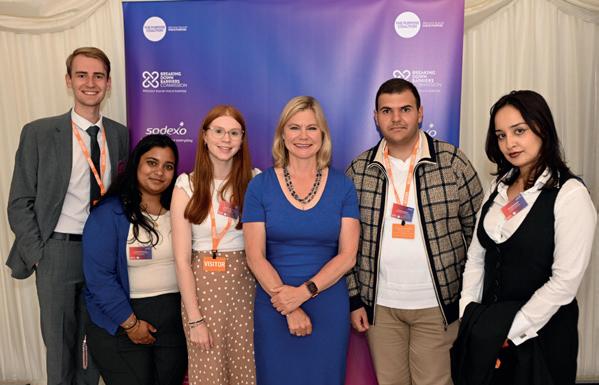
Making an impact for people and place by Prof Mark Power of Liverpool John Moores University
Levelling the playing field by Leanne Taher-Bates, Head of Access, Participation and Student Success at Liverpool John Moores University
Afzal Khan visits GBS
Purpose Lab students head to Westminster
The future is skilled by Capital City College
Starmer’s Reset
Labour in Liverpool
Badenoch’s Balancing Act
Reform UK’s 2025 Conference Homes, Hurdles, and Hopes
Building Momentum
Britain’s Long Game
Tomorrow’s Economy
Editor Kevin Wilson
Political Editor Jack Savage
Columnists

by the Rt Hon Justine Greening
Politics has rarely felt so febrile. But in an ever-changing political landscape, in terms of the big issues to fix, there remains a constant truth - opportunity should be for everyone, not just the privileged or well-connected and not just in wealthier areas of the country. The Purpose Coalition was founded on that principle of opportunity for all, and its importance has never been clearer.

Social mobility is not an abstract ideal. It is the lifeblood of a fairer, stronger and more productive Britain. Yet too many people are still locked out of the careers they deserve, their ambitions constrained not by talent or effort but by circumstance. Part of the solution is undoubtedly education. But our work at The Purpose Coalition has also focused on another crucial bit of the fix: urging employers to understand that they are the too often missing ingredient in addressing social mobility. Through The Purpose Coalition we are working with partners in sectors as diverse as defence, transport, services, health and education. They are proving that authentic purpose on driving access to opportunity, delivered via collaboration, can produce innovative solutions and positive results.
Amid shifting political winds, the call is the same as it has always been: opportunity for all.

Now we are seeing the Government, as an employer, also taking practical steps to distribute opportunities across a wider talent pool. Recently, Ministers announced that Civil Service internships will be ringfenced for working-class applicants. For some departments such as HM Treasury, disproportionately taking talent from the highest socio-economic backgrounds, it’s vital to bring in broader perspectives. It can especially make a difference to have more civil servants with a lived experience of social mobility in a government which has a policy agenda that includes a mission on ‘Breaking Down Barriers’. Elsewhere, we have seen Cabinet Office issue updated public procurement rules so that contracts reward businesses that have a bigger, positive social impact than simply the assessment of their provision of a good or service. This is also a step forward. It makes sense to try to have the maximum impact for every taxpayer pound spent.
Policy shifts like these matter as they give employers, whether in the public or private sector, a clear indication of where this Government is likely to go with a wider policy agenda on the role it sees for employers in breaking down barriers. As an employer itself, it is road-testing ideas not only to pursue its objectives but also to assess whether to ask other employers to follow suit.
This is a country with a welfare bill that seems far too high and a growing level of NEETs (young people not in education, employment or training) and talent going to waste. We should expect an ever-sharper political focus on whether employers can adapt to be part of the solution, and how.
It’s not only about fairness, it’s about societal resilience and economic growth. A Britain that unlocks the fuller range of its talent is better equipped to navigate change, to compete globally and to build a more united society at home.
Social mobility is not a side issue - it is central to this country’s successful future. I’ll be delving into the many different aspects, challenges and solutions in my new LinkedIn newsletter – Opportunity Central. I will discuss the state of the economic and political landscape for social mobility but crucially also feature the solutions out there - people and organisations who are making a real difference.
Amid shifting political winds, the call is the same as it has always been: opportunity for all. Expect to see this Government double down on this crucial mission. But expect to see it ask employers to join the push more strategically too.
by Nick Forbes CBE
The United Kingdom is scarred by regional inequality. Nowhere is that divide felt more sharply than in the North East. Life expectancy is shorter, wages lower, transport links weaker and routes into high-value jobs harder to find. These gaps are not abstract statistics but lived realities in communities that know they are being left behind.

That divide is seen clearly in education. Each summer’s exam results tell the same story: the gap between London and the North East is widening. This year, 32 per cent of entries in the capital achieved A or A*. In the North East it was less than 23 per cent - the lowest of any region and the only one where top grades have fallen since before the pandemic.
This is not about standards. Our teachers are outstanding, and our students show ambition and resilience. The problem is structural. Poverty, health inequalities, patchy transport and a lack of investment in education and training combine to create barriers that cannot be dismantled in the classroom alone.
Lower attainment at 18 closes off access to leading universities and competitive apprenticeships. That, in turn, feeds into a labour market already marked by fewer high-skilled jobs and lower wages. The cycle continues: talent is wasted, communities lose out and the region falls further behind.

I grew up in the North East. I saw friends as bright as any in the country denied opportunities simply because of where they lived. Talent was not the issue – access was. That experience drives my work now as Chair of the Breaking Down Barriers Commission. We cannot accept a society where the postcode you are born in dictates the life you can lead.
If we are to break this cycle, we must start with skills. Education should not only prepare young people for exams but equip them to thrive in tomorrow’s economy. That means parity of esteem between vocational and academic routes, with apprenticeships and technical qualifications leading to the same highstatus careers as degrees. Closer ties between schools, colleges and employers will help local skills strategies align with real opportunities in clean energy, advanced manufacturing, health innovation and the digital economy. We need targeted regional investment, to level up access to digital infrastructure, careers advice and employer partnerships. And inequality takes root long before a child sits their first exam so early years and family support is vital, through initiatives like Best Start hubs.
I grew up in the North East. I saw friends as bright as any in the country denied opportunities simply because of where they lived. Talent was not the issue – access was.
We can’t afford another decade of drift. If regional inequalities persist, the gap between the North and South will widen. That is why the work of the Breaking Down Barriers Commission is critical. Our mission is clear: to dismantle the obstacles holding back talent, to shine a light on inequality wherever it exists and to ensure that every young person, regardless of background or location, has the chance to succeed. Working with our partners as forces for good in business, education and health, we are developing solutions that will deliver opportunity where it is needed most.
The students who collected their results this summer deserve more than praise for their determination. They deserve a system that backs them with investment, opportunity and skills that open doors. If we are serious about breaking down barriers, then this must be the decade we deliver for the North East and for leftbehind communities across Britain.
Targeting investment into left behind communities isn’t just necessary, it is a moral imperative
Too many of our neighbourhoods, our people, and the places they call home, have been neglected for far too long.

by Sureena Brackenridge MP Member of Parliament for Wolverhampton Norh East and Breaking Down Barriers Champion.
For generations, Governments have lacked the courage and the will to strike at the heart of the problem, which has allowed left-behind areas to sink further, becoming shells of the thriving communities that they deserve to be. Generations of children have been raised without hope, and without the skills, investment, and opportunities that they need to succeed.
I’m calling for bold, targeted investment to rebuild our communities and restore hope where it’s been lost. I saw it in the classroom, every single day, but we see it in our streets, and in our towns and cities. Poverty has set in as generational. No longer is it something facing some of us, but it is an inherited cycle of crushing, unfair wealth inequality, totally ingrained into our society, and seeming as if its grasp is impossible to break. But how did we get here. In such a rich country, how can it be that so many of our places are so poor? That challenge has to be faced, and faced head on. We don’t want to be the Government that breaks this cycle, we need to be that Government.
When we enter Parliament, we understand that it is a huge responsibility. Elected for five years, we face a monumental task: trying to improve lives, for the people and places we represent, and all across the country. It doesn’t matter if you’re in the post-industrial cities of the West Midlands, the mining towns of the North, or so much of inner city London, these are fiercely proud places, but they are places that have been forgotten. Places where communities are struggling. Places were people feel that Government is something that is done to them, not with them. Places that have not seen the investment they need, and do not feel as if they have seen proper changes in their quality of life.
Changing this is a vital mission for us, but it is even more vital for those who are experiencing living at the fringes of our democracy, suffering from a lack of housing, education, work, and healthcare.
That’s why I called for a led a debate on the role of neighbourhoods and their revival and renewal in Westminster.
From across the country, MPs gathered to give testimony and evidence to the problems they have seen.
This was a difficult discussion which was uncomfortable to hear, and will in the coming weeks and months be even more unpleasant to dissect. But that is exactly why we are having these conversations. For too long, I worry people in power didn’t have them, which has contributed to where we have ended up. The evidence from this debate was clear, our neighbourhood have been left to decline.
Community has lost its meaning, young people feel as if they have nowhere to go, and adults can’t access the jobs and opportunities they need to break free.
What do we have to do?
We need a return to mission-based Government, where we learn from and with communities, to understand exactly what it is that they need to improve their lives. So often, we think about regeneration and investment as buildings, but it has to be so much more than that. Flashy projects and new homes are vital, but they need to be developed alongside permanent, sustainable solutions. We need to get right to the heart of cultural capital and social infrastructure, centred around communities, with places to meet, gather, linger, and learn. We can build homes anywhere, but building a community, or a place of shared values, is different.
Think about where so many of us grew up. It was safe to walk down the street, the community centre had the services we need. We bumped into friends and popped down the shops. These were sustainable communities that got lost to time. Services, education, and investment got further away from communities. That’s the kind of thinking that we need to change.
I think about The Scotlands Estate in Wolverhampton with the Big Venture Centre, or the Hive in Walsall. These are neighbourhoods that need interventions but also have the kind of infrastructure that we are talking about. Volunteers, community chefs, and a community shop. Proper community-focussed work, right at the centre of the neighbourhood.
We have the model and we have the knowledge.
So, let’s take that mission on. Let’s take our campaign all the way to the top of Government.
Let’s back our people. Let’s back our places. Let’s rebuild our neighbourhoods.
The UK has a once-in-a-generation opportunity with the clean energy transition. It is not just about tackling climate change, but the biggest economic renewal project in decades. It means more affordable bills, greater energy security and a workforce based on new skillsets which are delivered for communities across Britain.

This Government has made its intentions clear: build Britain into a clean energy superpower. The only way this will work is if we can create the workforce to deliver it.
At E.ON, we are already making this happen. From training apprentices to installing the infrastructure that will power the next century, we are proving that green careers are the future, and that the benefits can be felt from our biggest cities to our smallest towns.
Green skills are not confined to new technologies; they build on skills Britain already has. Our experience shows how this works in practice. A customer service advisor retrains as an energy efficiency specialist. An electrician gains EV charging and battery storage skills. A smart meter installer becomes a multi-skilled technician fitting heat pumps and solar panels.
The green energy transition is not an abstract goal, it’s something that shuld be visible and beneficial in local communities
Since 2018, we have trained more than 1,000 apprentices across 100 programmes ranging from engineering to finance, project management to digital marketing. Our Net Zero Training Academy in the West Midlands alone educates 800 people every year, equipping them with the capabilities the transition demands. Not all skills are technical, so we are also equally focused on project management, finance, supply chain expertise and data science – the “enabling” skills that will make delivery possible.
Green jobs should offer fair pay, proper training and real progression. That is why we work with four major unions to set standards and ensure workers share in the benefits of the transition. E.ON has featured in the Inclusive Top 50 UK Employers list for six years running and was recently named The Sunday Times’ Best Place to Work for Young People. These accolades matter because they demonstrate that a green economy can also be a fair economy.
The transition is not an abstract national goal, it is something that should be visible and beneficial in local communities. Our Strategic Energy Partnership with Coventry City Council shows what is possible, from solar farms to energy efficiency programmes reducing fuel poverty for thousands of residents. Our partnership with Dudley College on the Net Zero Solutions Hub offers another model: a fully self-sustained building equipped with solar panels, EV chargers, heat pumps and battery storage which helps local students learn about the future of energy.
The green economy is not something we are waiting for, it is already here. Every day, our teams are out
installing smart meters, solar panels, EV chargers and heat pumps in homes and businesses across the country. We are delivering Britain’s largest rooftop solar project for Peel Ports in Liverpool, which will include more than 63,000 panels when complete. Our plans include investing £2 billion in heat networks in Sheffield and London which will demand installer, engineering and project management jobs. We have supported major public institutions, from upgrading heating systems at Queen’s Medical Centre in Nottingham to replacing 17,000 single-glazed windows, slashing bills and emissions alike.
The UK’s clean energy potential is vast and it will not be realised without a deliberate, coordinated push from government and industry. We believe the country must expand green apprenticeships to ensure every region benefits from new opportunities, create local training centres linked directly to infrastructure delivery, and make the energy transition something people can actively take part in, giving communities ownership rather than just outcomes.
The clean energy transition is more than a climate imperative; it is a chance to re-industrialise Britain for the 21st century and an energy secure future. The choice before us is clear: continue to face volatile global energy prices out of our control or develop the people and skills at home to secure our energy system, boost the economy and lower our bills.
At E.ON, we have made our choice. We are building Britain’s green workforce now, and we are ready to work with government and Britain’s communities to ensure no one is left behind.

In June, the Government delivered its Modern Industrial Strategy (IS) – a landmark document, signed by the Prime Minister, Chancellor, and Secretary of State for Business and Trade. Throughout the case studies and interventions, one word appeared 140 times: Skills.
I am proud to work for a business with such a positive impact as Leonardo. The company supports over 31,000 jobs across the UK and contributes £2.5 billion to economy annually, all while supporting our Armed Forces with the cutting-edge technology they need to keep the country safe. But I believe that our greatest strength lies in our power to break down barriers to meaningful employment in the communities in which we operate, through skills.
The aerospace and defence industry has historically been located in areas outside of London, bringing sustained economic stability since the early 20th century. Professor Trevor Taylor observed this in his paper on our industry’s impact on local prosperity, published by RUSI earlier this year, and named Leonardo as an exemplar of a large firm that can train apprentices and graduates thanks to long-term prospects of orders. I am in full agreement with Prof. Taylor, especially as I note the 900-strong Early Careers community based at our sites from Edinburgh to Yeovil (via Newcastle, Basildon, Lincoln, Luton, Bristol and Southampton).
For some communities, defence work is the foundation of economic and social well-being and we’ve seen how it can bring rewarding employment in otherwise struggling places. When I talk with colleagues around the business, it is clear that those in our company feel that Defence is a vocation; we have a purpose. When the Prime Minister visited our site in Luton earlier this year, we were heartened to hear that the Government recognises, and deeply supports, that purpose. Our people are fired up by the level of regard in which this government holds their efforts, and they value those efforts for a reason: because those efforts underpin the safety and security of everyone in this country.
My pride in our industry is not limited to the sense of purpose it instils, or to the well-paid jobs it produces; it is the highly skilled nature of a lot of our work that makes me proudest. Members of our yearly intake of young people are routinely promoted to senior positions following their apprenticeships, many of whom have gained a degree or other qualifications along the way, entirely funded by the company.
Our graduate schemes, too, develop promising graduates into the engineers and business professionals of the future, straight from university. This is all thanks to our investment in maintaining a skilled workforce and expanding the UK’s pool of engineering resources.
We therefore welcome the interventions recommended in the IS for the government to align its skills system with the IS-8, the key growth sectors it identified including Defence and Advanced Manufacturing.
Although I believe that one of the best ways to break down barriers to opportunity is by offering good, wellpaid jobs with the ability to acquire skills based in less well-off areas (as Leonardo does), we can always go further. I was delighted that the company renewed its Future Leaders programme earlier this year, supporting a second cohort of young women in developing their resilience, skills and confidence to help them achieve their career aspirations. Women make up just over 15% of the engineering and technology sector (and 21% of Leonardo’s workforce), and it is our continued ambition to achieve a greater gender balance in terms of both career development and opportunities. This sits alongside our Springboard development programme, open to all women across the company, both in the UK and globally. I myself have completed the programme, and I found it hugely helpful in encouraging women to find their voice in order to grow into leadership roles. Through these programmes; our work with the Women’s Engineering Society; and as signatories of the Women in Defence and Women in Aviation and Aerospace Charters, we are closing that gap and providing as many opportunities to Women in STEM as possible.
The government acknowledges the need to enhance skills and accelerate access to talent in order to grow the economy; at Leonardo, we are already boosting skills in our workforce and widening the talent pool in our industry, and look forward to working with the Government to implement the skills recommendations set out in their Industrial Strategy.
Aldermore recently confirmed it’s status as an accredited lender under the Invoice Finance and Term Loan variants of the British Business Bank’s Growth Guarantee Scheme (GGS), the successor scheme to the Recovery Loan Scheme (RLS), under which Aldermore was also an accredited lender.
The GGS provides Aldermore and other accredited lenders with a government-backed guarantee and the borrower remains 100% liable for the debt. This scheme is designed to support access to finance for UK SMEs as they look to invest and grow. It also aims to improve the terms on offer to borrowers and is available to both existing Aldermore Invoice Finance clients and new prospective clients.
Aldermore’s Invoice Finance GGS features include:
• Maximum facility of £2m per business group
• Fixed £ value up to the maximum of the facility review limit, with value to be determined by Aldermore
• Increase on facility limit can be considered to accommodate some extraordinary events but cannot include inter-company debt, aged debtors and disputed debt.
Aldermore’s term loan GGS features include:
• Sits alongside the client’s invoice finance facility with Aldermore
• Term loans between £25k and £2m per business group1
• Term length available between three months to six years.


Chris Meldrum, Head of Business Development of Invoice Finance at Aldermore comments:
“As a long-standing partner in Government backed lending schemes, it’s a natural step to now offer the Invoice Finance variant of the Growth Guarantee Scheme. This initiative allows us to continue providing vital financial solutions that help businesses invest, scale, and drive economic growth.
“At Aldermore, we understand the challenges SMEs face in accessing finance, and we’re committed to
offering flexible and tailored funding options that empower them to succeed.”
Reinald de Monchy, Chief Banking Officer, British Business Bank said: “We’re delighted that Aldermore has been accredited as a delivery partner under our Growth Guarantee Scheme. Their provision of Invoice Finance and Term Loans will help to increase the choice and diversity of finance available to smaller businesses in the UK. We look forward to seeing the growth that Aldermore can help generate for the businesses they support.”
At Aldermore, we understand the challenges SMEs face in accessing finance, and we’re committed to offering flexible and tailored funding options that empower them to succeed.

When students are settling into their university accommodation, strolling around their campus or grabbing lunch, how much do they know about the people working behind the scenes to ensure everything runs smoothly?
Sodexo might not be a household name to most students, but its work impacts the everyday lives of thousands across campuses worldwide.
With over 50 years’ experience in the education sector, Sodexo is a trusted partner to many universities across the UK, including Purpose Coalition universities. CEO of Schools & Universities UK, Tracey Smith, and Growth Director, Laura Brimacombe, got together with Purpose Lab Ambassadors recently to talk about the company’s role which encompasses everything from catering to student accommodation and broader facilities management.
Many of the participating students were interested to hear about the wide range of work Sodexo does on campus, from phone calls to every new student ahead of the new term to its flatmate finder system and from cookery classes to budgeting courses.
Its aim is to help students embrace the challenges of their new life, making sure that every touchpoint is a positive and welcoming experience.
That ambition to get things right extends to Sodexo’s catering services, guiding the development of a food experience that offers choice, convenience and value for money. It also needs to be inclusive, sustainable and responsive to evolving student needs.
There are meal deals, loyalty points and promotions designed around student preferences, reflecting the sort of catering options found on the high street. At this session, Sodexo were able to tap into Purpose Lab Ambassadors’ diverse experiences and perspectives, particularly around the challenges of sustainability and affordability.

Sodexo’s Schools and Universities arm has the aim of helping students embrace the challenges of their new life
It gave them a unique platform to provide feedback and ideas such as the importance of meeting diverse dietary needs. They were also interested to learn more about Sodexo’s extensive social impact credentials, including initiatives like its global Stop Hunger Foundation which supports communities facing food insecurity and empowers people to escape cycles of poverty.
Sustainability was a focus of keen interest and students heard how Sodexo’s work with another Coalition partner, Solent University, achieved a reduction in food waste by 48% in their first year of partnership and eliminated 24,000 plastic bottles by switching to cans.
Sodexo works hard to gather insights from diverse university campuses, leveraging the data to help tailor the food and facilities to student needs but, importantly, to also measure its long-term impact on student wellbeing, retention and sustainability, quietly creating environments that support students and enable them to thrive, academically and socially.
Purpose Lab Ambassadors are helping to ensure that student voices are heard and can shape the services they use every day at university, collaborating with a purpose-led organisation that is willing to listen.
By engaging directly with students on the issues that matter to them, Sodexo isn’t just managing campuses – it’s learning, adapting and improving the student experience.

In today’s fast-paced hospitality industry, stories of resilience and determination stand out. Few embody this better than Eliana Ramos Vieira, whose personal and professional journey reflects the power of perseverance, inclusivity, and leadership. From arriving in the UK as a teenager with no English to managing one of Travelodge’s London hotels, Eliana’s story is one of overcoming challenges and redefining what success looks like.
Born in Lisbon, Eliana Ramos Vieira moved to the UK at 13, facing the daunting task of adapting to a new culture with no knowledge of English. Initially withdrawn and misunderstood, she overcame language barriers through perseverance, eventually supporting her mother-then a housekeeper at Travelodge-by translating documents and helping with administrative tasks. This early exposure introduced her to the hospitality industry.
At 18, while studying nursing, Eliana joined Travelodge as a team member. When student finance delays created financial strain, she worked full-time to support herself and her mother, balancing study and work with determination.
Eliana’s career quickly advanced. She became a Supervisor, then acted as Hotel Manager during a colleague’s leave. In 2021, she secured an Assistant Manager role and by 2023, was promoted to Hotel Manager at Travelodge London Bermondsey-making her one of the company’s youngest in the role. Her leadership is deeply informed by her own experiences of intersectionalitynavigating race, language, class, and gender. She champions inclusivity, ensuring her diverse team feels seen and supported. From translating key documents to promoting open communication, Eliana breaks language and cultural barriers.
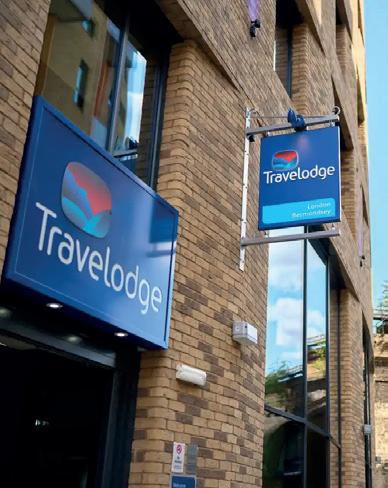
A passionate advocate for professional growth, she encourages her team to join the Aspire programme, crediting it with her own development. Eliana believes in recognising talent beyond background, creating a workplace where everyone can thrive.
Her story embodies how intersectionality shapes professional journeys and highlights the power of inclusive leadership.
Eliana’s rise is more than just a personal achievementit’s a powerful reminder of how opportunity and determination can transform lives. Her leadership reflects the importance of creating workplaces where diversity is celebrated, and talent is recognised in all its forms. As the hospitality sector continues to evolve, leaders like Eliana are showing the way forward: inclusive, resilient, and committed to unlocking the potential of every individual.

Starting your first job is excitingearning your own money, enjoying independence and perhaps thinking about that big purchase. But amid the buzz, there’s a crucial element that is often overlooked: financial fairness. Knowing how pensions and savings work isn’t just for later life. Getting savvy about your financial future right from day one could be the smartest move you make.
Recently, Purpose Lab Ambassadors had the opportunity to share what financial fairness means to them.
As students, many were already negotiating financial challenges and some had personal experience of family and friends who had faced significant barriers to managing their money. They also considered whether private companies have a wider role in building a fairer society. The message from them was clear: financial education is essential, and companies do have a real part to play.
Enter Equiniti. On the surface, Equiniti handles pensions, shares, and savings for millions across the UK and internationally. Behind the scenes, however, they’re also powering fairness by ensuring financial services are accessible, transparent and inclusive for everyone, helping the elderly, digitally excluded and vulnerable people, protecting against fraud and making complex finance fair and understandable, especially for new employees starting out in their careers.
financial fairness isn’t just about money; it’s also about understanding and accessibility
Ever heard of a Save As You Earn or Sharesave scheme? Equiniti helps businesses establish these straightforward plans, allowing employees - even young starters - to regularly save directly from their salary. It’s more than just building a savings pot or owning company shares; it’s about creating equal financial opportunities and fostering a fairer society.
So why does this matter now? Because the small financial choices made early on can drastically shape your future. Imagine the security of retiring comfortably because you started contributing at 20, not 40. Imagine the peace of mind from knowing you have a safety net in emergencies. Equiniti champions this mindset, promoting early financial awareness as a cornerstone of lifelong fairness and independence.
In a session with Caroline Gascoigne, Equiniti’s Group Apprenticeship & Qualification Manager, Purpose Lab Ambassadors discussed how financial fairness isn’t just about money; it’s also about understanding and accessibility. Equiniti recognises this by offering user-friendly digital platforms and supportive, personal guidance. Whether you’re digitally savvy or prefer traditional methods, Equiniti ensures no one is left behind.
Rt Hon Justine Greening, Chair of the Purpose Coalition and former Secretary of State for Education added: “Our Purpose Lab student ambassadors were frankfinancial knowledge matters to them from day one.
Equiniti is listening. They aren’t just managing pensions and savings-they’re powering fairness: simplifying complex finance, supporting the digitally excluded, and enabling straight-forward Save As You Earn schemes so newcomers can save directly from their pay.
This matters because early financial awareness shapes futures-secure retirements, emergency cushions, real independence.”
Session participants also focused on the fact that businesses have significant power to create fairer societies. Equiniti embodies this role, demonstrating how businesses can positively influence social fairness. They don’t just manage finances; they educate, protect, and empower individuals, bridging gaps in knowledge and accessibility. With 6000 employees, Equiniti also offers a range of careers, not just in finance but in customer service, tech development, human resources and fraud prevention, providing opportunities for people from every background to contribute to the company’s mission, helping their employees to help others manage their money.
So, if you’re celebrating your first pay day, remember: financial literacy and fairness matter immensely. Equiniti powers this fairness, quietly ensuring every individual, from graduates newly out of university to seasoned professionals, has equal opportunities to secure their financial futures. And that’s something genuinely worth celebrating.

by Ruth Cadbury MP
In my West London constituency of Brentford and Isleworth, I rarely think twice about catching a bus. I know one will arrive within minutes; the fare will be the same wherever I’m going, and the service will run late into the evening. In London, buses are predictable, affordable and part of everyday life.
Step outside the capital, though, and the picture changes dramatically across most of England. Our Committee’s inquiry into Buses Connecting Communities laid bare just how unequal the system has become. Across much of England, especially in smaller towns and rural areas, services have been stripped back. Over the past decade, passenger journeys have fallen by almost 12% outside London, compared with just 1.4% in the capital. In the north of England, bus mileage is down by a third since 2010.
Behind these numbers are real stories: jobseekers unable to take work because the first bus runs too late, older people isolated when their only route into town disappears, and young people missing college because travel costs are unaffordable. Today, more than 11 million people in England face transportrelated social exclusion.
The fixes are not complicated. Ireland’s Connecting Ireland programme has guaranteed a basic service for rural communities, sparking a surge in use. We should do the same: set a national minimum standard so no community is left disconnected.
We also need long-term certainty. Rail and road projects are funded in five-year cycles. Buses, still the most used form of public transport in England, deserve the same stability.
And fares must make sense. In London, a simple cap and integrated system works. Elsewhere, passengers face a confusing lottery. Since deregulation, fares have risen by more than 500%. The temporary £2 (now £3) cap helps, but it isn’t a strategy.
The decline of bus services has been allowed to drift under the radar. Because buses are less glamorous than trains or roads, their erosion has barely made headlines. Yet it is cutting people off from opportunity every single day.
As Chair of the Transport Select Committee, my message is simple: if London can guarantee frequent, reliable, affordable buses, so can the rest of England. The right to catch a bus should not depend on your postcode.

• Connect 38 brings together recruitment, training and digital learning to help support a skilled, agile and modern railway
• New facility supports commitment to growth, opportunity and social mobility
• Rail Minister joins colleagues to celebrate investment in future recruits and current colleagues
South Eastern Railway has marked a major step in its ambition to build a modern, inclusive and highly skilled workforce, as Rail Minister Lord Hendy joined colleagues to celebrate the opening of its new careers and skills hub in Ashford on Friday (11th July).
The centre – known as Connect 38 - is situated a short walk from Ashford International railway station and brings together recruitment, digital learning and professional development under one roof, creating a dynamic environment for new starters and existing colleagues to grow their careers on the railway.
Demand to join South Eastern Railway is growing exceptionally quickly, with more than 30,000 job applications in the last year alone, compared to just over 14,000 the year before. Connect 38 represents a significant investment in the company’s people, helping to more than double the capacity for recruitment and training and providing the next generation of talent.
The formal opening comes on the same day Southeastern is ranked 24th in the prestigious ‘Sunday Times Top 100 Apprenticeship Employers’ for 2025 – a remarkable rise of 34 places compared to 2024 and the highest placed transport or rail company.
From train drivers and engineers to customer service and digital specialists, the centre will support hundreds of apprentices, offer targeted pathways for school leavers, veterans, and career-changers, and deliver on the Government’s skills agenda.
Rail Minister Lord Peter Hendy said:
“Under public ownership, South Eastern Railway is making real changes that not only improve the lives of passengers but staff and local communities too. This is exactly what we want to see operators doing, offering skills and training to ensure their workforce is open to everyone, from schoolleavers to career-changers to veterans.
“Through this investment, we will see more and more skilled, rewarding careers in the rail industry open up as Connect 38 breaks down barriers to opportunity, drives economic growth and supports the Government’s Plan for Change.”
Steve White, Managing Director, South Eastern Railway, said: “The railway does more than connect people and places. It unlocks opportunity, supports housing, enables social mobility and helps communities thrive. What we do matters!
“In the last year alone, we have seen a huge increase in interest from people wanting to build a career with us with over 30,000 applicants.
South Eastern Railway brings together the publicly owned train operator Southeastern and infrastructure provider, Network Rail Kent Route, under a single leadership team.
More than just a careers and skills hub, Connect 38 is also a tribute to the people who have shaped the railway’s past and present. Rooms at the facility have been named after former colleagues and historic figures who made a lasting impact on the railway, including pioneers like Barbara Ann Denny, the network’s first female train driver, and Asquith Xavier, who fought for racial equality in British transport.
We are also committed to developing our own people.
“This new facility, located at the heart of our network, demonstrates that our new integrated railway will invest in our people , as well as our infrastructure.
“Whether someone is joining us for the first time, retraining, or progressing in their career, this centre will give them the skills and support they need to succeed and to support our customers.”
Neil Robertson, Chief Executive, The National Skills Academy for Rail (NSAR), added:
“Southeastern were one of the first operators to embrace apprenticeships and have always taken training very seriously. This is an exciting new opportunity. Knowing them as we do, we expect to see strong social value created alongside the development of new skills.
“With a wide range of jobs available across the rail industry, initiatives like this help to strengthen routes into rail and ensure the sector attracts the talent it needs for the future.”
Connect 38 also directly supports the Government’s skills agenda and offers career guidance, training facilities, digital learning, and apprenticeships across a wide range of roles – including train drivers, engineers, and customer service teams as well as dedicated digital media room to allow colleagues to record professional quality videos for a range of purposes.
South Eastern Railway is proud to support over 500 apprentices across the business, and has previously been awarded Gold Accreditation by Investors in People for the approach to People, Wellbeing, and Apprenticeships.
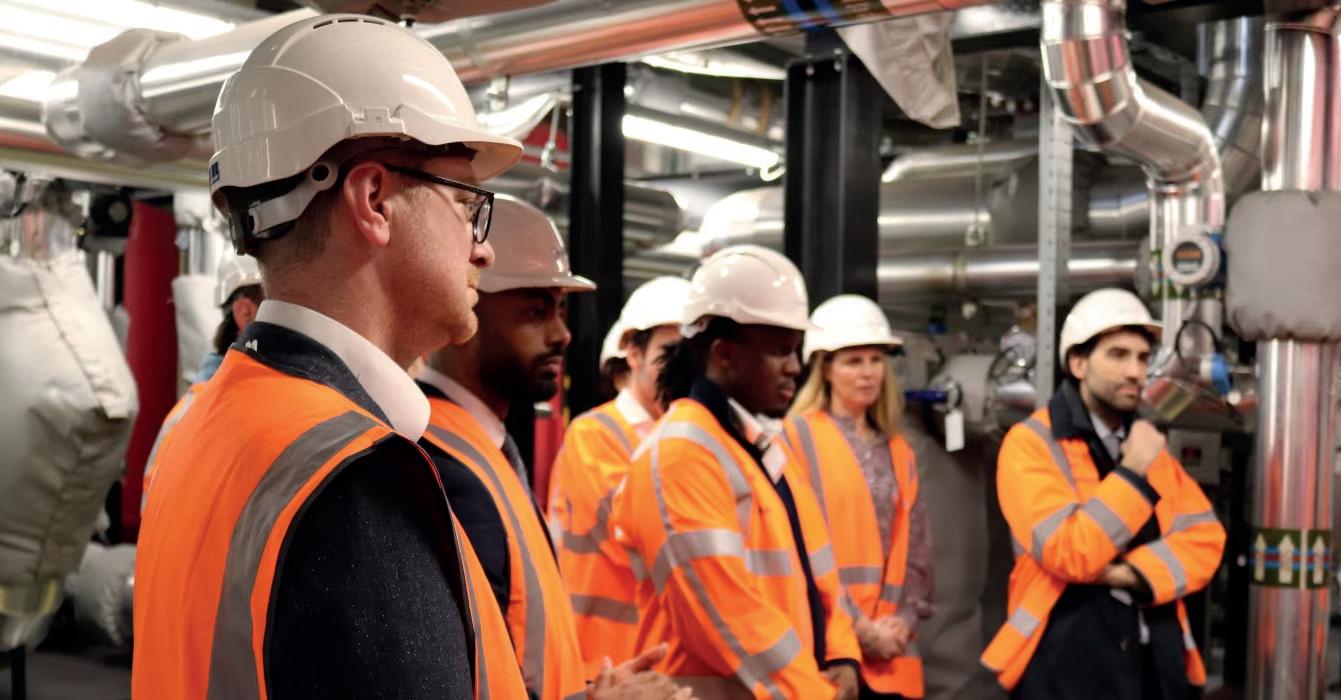
Heating our homes while cooling our carbon footprint has taken a big step forward thanks to an innovation from UK Power Networks.
Decarbonising heat is one of the biggest opportunities in helping the achieve the UK’s journey to Net Zero.
Currently, heat networks make up just 3% of the country’s heating demand, but this is set to rise sharply to 20% by 2050*. Moving from fossil fuels to electrified heat networks (which deliver heating and hot water from a central energy source) will not only play a key role in cutting carbon emissions but will also put new demands on electricity infrastructure.
HeatScape combines datasets, advanced modelling, and real-world insights
To better understand and plan for this change, UK Power Networks has joined forces with Arup, Environmental Resources Management and Bring Energy (who own and operate the East London Energy Distribution Heat Network) to launch HeatScape.
This innovative project will map where heat networks exist today, predict where they’re likely to grow, and estimate how much electricity they’ll need under different scenarios.
Building on the earlier Flex Heat Networks initiative, HeatScape combines datasets, advanced modelling, and real-world insights to give a detailed picture of how electrified heat networks will interact with the grid. By integrating this information into UK Power Networks’ Strategic Forecasting System, the project will enable more informed decisions on how to prepare and adapt the electricity network for the future.
The project will also explore more flexible management of heat networks, for example, by using thermal storage to reduce peak electricity demand.
HeatScape will work with Bring Energy’s customers to explore their interest in energy flexibility, as well as support the adoption of low-carbon technologies, helping to accelerate the transition to cleaner energy systems.
This project, alongside Heatropolis, demonstrates UK Power Networks’ innovation in the field of heat decarbonisation.
Luca Grella, head of innovation at UK Power Networks, said: “Decarbonising heat is one of the biggest opportunities we have to create a cleaner, more efficient energy future. With HeatScape, we’re taking a proactive approach, working with our partners to understand where heat networks will grow and how they’ll interact with the grid. By combining data, modelling and customer insights, we can plan smarter, reduce costs and make sure the transition to low-carbon heating benefits everyone.”
Stephen Hutchins, concession director at Bring Energy, said: “As operators of East London Energy, one of the UK’s largest heat networks, Bring Energy see first-hand the importance of forward-looking, data-driven planning in the shift to low-carbon heat. HeatScape will give us a clearer picture of how and where heat networks are likely to grow, and what that means for our electricity infrastructure. We’re excited to be partnering with an industry leader in innovation like UK Power Networks to explore new ways to make heat networks more flexible, including smarter use of thermal storage. We believe this collaborative project will help accelerate the transition to cleaner, more efficient energy systems for communities across the UK.”

In a post-pandemic UK, the need for young people to become resilient and deal with adversity is a pressing challenge.
This is especially true for those facing additional barriers - whether living in poverty, managing special educational needs or coping with disrupted education. These factors often combine to reduce opportunity and affect mental health, attendance, and future prospects.
Last week at our Dearne Valley centre, PGL Beyond piloted its Skills4Life residential, a purposive outdoor adventure learning programme designed to build resilience, raise aspirations, and strengthen what research identifies as the “Four Cs” of 21st century skills: communication, collaboration, creativity, and critical thinking. Fully aligned to the Skills Builder Universal Framework and accredited at Level 3, the programme blends high-quality outdoor learning with structured personal development that is both engaging and measurable. Sheffield Hallam University will evaluate the pilot to evidence its impact and ensure it continues to meet the needs of the young people it serves.
Over five days, participants tackled a progressively challenging mix of activities - from raft building and Jacob’s Ladder to the Epic Challenge - each adapted to offer autonomy, stimulate curiosity, and create personal meaning. Evening reflection campfires brought the group together to share experiences, celebrate achievements, and embed the adaptive thinking that helps young people thrive, not just survive, in uncertain situations.
Our recruitment team joined forces with Loud Speaker, whose For Love or Money workshop develops communication skills, confidence, and self-presentation. Together, we showed participants how the skills they were building could be applied directly to real-world opportunities, including roles at PGL Beyond. As an accredited living wage employer offering positions with on-site accommodation, we provide opportunities that can give young people a clear step into a different future. This link between personal development and tangible next steps is vital in breaking down barriers and opening doors to meaningful futures.
Early feedback has been striking. Young people spoke about finding strengths they didn’t know they had; support staff described growth in confidence, teamwork,
and problem-solving. For those with limited access to environments that engage, inspire, and challenge, this inclusive, multi-sensory approach is proving transformative.
PGL Beyond’s ambition is to build on our reputation for excellence by working with corporates, schools, multiacademy trusts, and local authorities to address the most pressing youth challenges. Through our growing network of partners, we see the potential for Skills4Life to become a truly national offer, complementing existing education, youth work, and employability provision. Our vision is to support every stage of a young person’s enrichment and development, from a Year 6 post-SATs trip, through a Skills4Life residential, and into employment. We also believe our approach can enhance wraparound services such as breakfast clubs and ‘HAF’ programmes. By delivering both in our centres and in the communities where young people live, we can remove barriers to participation, make enrichment inclusive, and open clear pathways to work.
When young people gain the skills for life, they gain the confidence to step forward - and with the right partnerships, those steps can lead somewhere extraordinary.
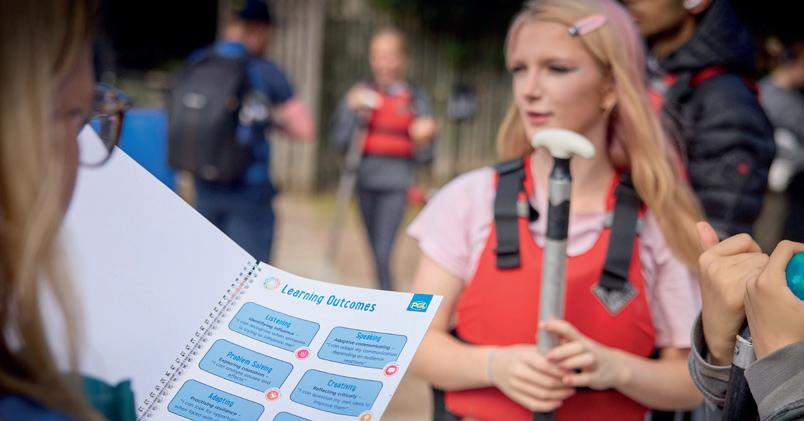
Located throughout Yorkshire, the Centres for Warmth concept was developed to ensure a holistic approach to supporting fuel poor households through trusted partners within a community setting.



They help people have access to a warm safe space and information designed to improve health and wellbeing, increase household income and better manage their energy.
The programme is funded by Northern Gas Networks through Ofgem’s Vulnerability and Carbon Monoxide Allowance (VCMA). Since the programme launched in March 2024, it has supported 20 grassroots organisations and groups throughout the North of England to establish a hub in their local community with 17,000 people benefitting. The most recent opened in New Wortley, Leeds in March 2025.
They help people have access to a warm safe space and information designed to improve health and wellbeing, increase household income and better manage their energy.
Andy Parnham, Leeds City Councillor for Armley, attended the opening in March and said: “I very much welcome this additional funding and support from Northern Gas Networks allowing the Centre to employ advice workers to assist some of our residents who are amongst the most vulnerable in the country. A great example of partnership working!”
New Wortley is one of the six priority neighbourhoods identified by Leeds City Council, so we have aligned our approach to specific needs of customers within Leeds.
The support on offer is wide ranging, from energy efficiency awareness to help combat fuel poverty, support with energy bill management and gas and carbon monoxide (CO) safety awareness, as well as CO alarm distribution. Other support includes:
• Enrolment on the Priority Services Register
• Money management and benefits advice
• Tips for cooking nutritious meals efficiently
• Social group activities to reduce isolation
• Distribution of energy-saving appliances
Since March, 2,000 individuals have been offered support from this centre including information and access to the Priority Services Register, Carbon Monoxide awareness, income maximisation and energy efficiency advice.

Decarbonisation should be seen not just as an environmental necessity, but as a once-in-a-generation opportunity to invest in people, places and potential. This is our chance to rebuild communities, create thousands of secure green jobs, end fuel poverty, and solve the issue of damp and mould in homes across the UK. The carbon savings? They’re not the end goal, they’re a powerful bonus of doing what’s right, not only for the people of the UK but also our infrastructure. If we get this right, everyone wins.
At Coleridge Court in Torquay, a development managed by a leading housing and care provider, Bell successfully completed phase one of a deep retrofit of thirteen 1970s retirement bungalows. The project aimed to improve energy efficiency, give residents warmer homes, cut bills, and build community pride.
Using TPAS best practice and the Together with Tenants initiative, we developed an engagement plan that gave residents a voice and kept them informed. We listened, minimised disruption, and held regular coffee mornings that became open forums where trust grew and ideas were shared.
This peoplefirst approach reflects our commitment to social mobility and inclusion. As a Platinum member of the 5% Club, we invest in apprenticeships to open career pathways in construction for people from all backgrounds.
At Coleridge Court, these values came to life; project spend was directed to local operatives and SMEs, creating and sustaining jobs, whilst bolstering the local economy. Our community team donated to food pantries, children’s hospital wards, and community centres. Retired laptops were recycled for homework clubs, surplus bricks were given to grassroots sports clubs to build storage spaces, and our team completed several greenspace cleanups on site.
Adhering to the Publicly Available Standard (PAS) 2035 guidelines and the net zero Energiesprong model, we undertook the comprehensive retrofit that included removing chimneys and installing new roofs, regularising ridge lines, and fitting new fascias with extended soffits and gables to fully encapsulate the external wall insulation (EWI). As part of the process, asbestos was removed, and passive fire-stopping measures were installed. We applied EWI and liquidapplied airtight membranes in lofts, increased insulation to further enhance the fabric of the building.
To boost energy efficiency, we fitted triple-glazed, inert gas-filled windows and doors. We also installed renewable systems including ground source heat pumps, solar panels with battery storage. Ventilation improvements were made with the deployment of decentralised mechanical ventilation with heat recovery in most homes, while two properties featured custom-designed centralised systems.


All work was completed with residents in place, thanks to careful planning and daily communication. The results have been lifechanging, homes are now warm yearround, bills are lower, and energy worries eased. At our first meeting, one resident told us her average monthly energy bill was around £260 per month; on a recent visit, she confirmed her latest bill was just £17.84.
Residents said: “The difference is incredible. My home is warm all the time now, and I don’t worry about my winter heating bill.” And “Everyone who worked on my home was thoughtful and understanding.”
A housing spokesperson added: “The success of Coleridge Court isn’t just in the energy savings. It’s in the relationships built and the opportunities created. Bell understood our values and brought them to life every step of the way.”
With phase one complete, we are preparing to transform another forty eight homes for our client. Our vision goes beyond this project, using schemes like Coleridge Court to drive social and economic change. The journey to net zero is also a journey towards greater equality, stronger local economies, and fairer futures. This is not just about better homes, it’s about communities and creating lasting social foundations alongside sustainable places to live.
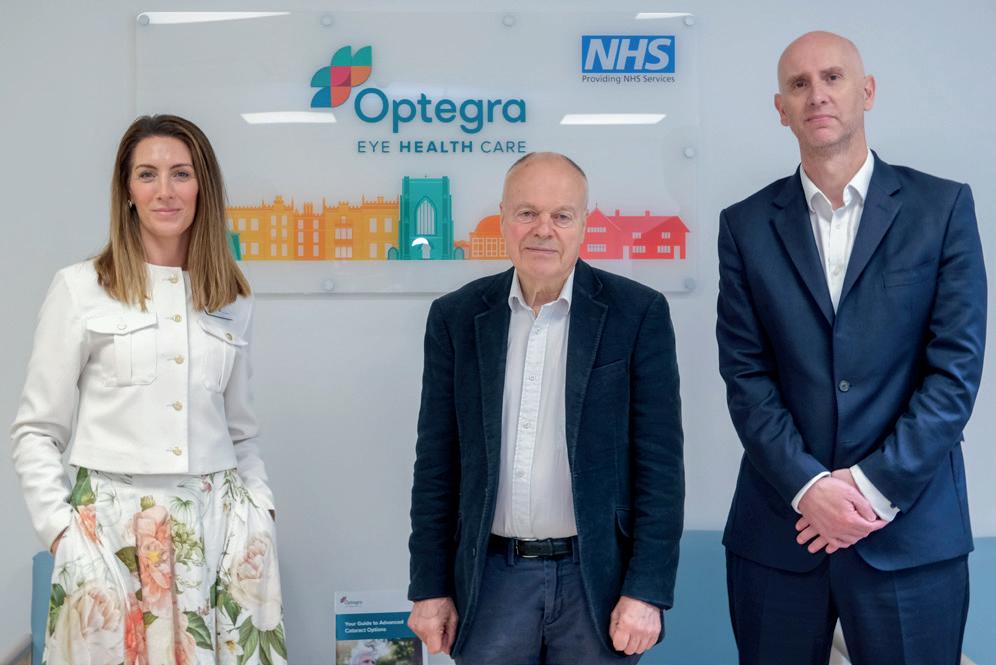
With one in three adults aged over 65 being diagnosed with cataracts, this clouding of the lens does much more than affect vision.
Poor sight due to cataracts – which will deteriorate until the patient’s operation – may increase risk of falls, cause a loss of independence, as well as stopping people driving and enjoying hobbies.
Timely treatment is therefore essential, and Optegra has treated over 50,000 NHS patients in the past year - five-star treatment with excellent outcomes within just weeks of referral.

The independent sector is pivotal in transforming NHS cataract care and this is an essential partnership to ensure cataract waiting lists do not creep up again. As an independent provider, Optegra is paid exactly the same as the NHS for each cataract operation, through the NHS tariff system.
Optegra UK - which has 19 specialist eye hospitalsis calling on MPs to deliver the best NHS services for their constituents, by ensuring access to clinics like Optegra, whilst relieving pressure on NHS Trusts.
Certain ICBs are asking the independent sector for less support than previously, as well as proposing a minimum wait to delay patients’ treatment up to 14 weeks –despite this opportunity for extra capacity being available.
Alongside this care, Optegra strives to improve patient experience. Therefore, for the first time ever in the UK, and possibly the world, Optegra offered NHS patients a pioneering “treble” of cataract care:
1. Pre-op consultation and treatment on the same day;
2. Bilateral surgery – both eyes treated within one procedure;
3. Revolutionary drop-free surgery.
While each element has been medically evidenced individually, Optegra is the first to offer all three to patients at one time.
Due to its success, Optegra is now offering drop-free surgery to all its NHS patients.
Optegra’s Medical Director and Consultant Ophthalmologist, Mr Alastair Stuart, explains:
“Optegra has developed a unique approach to NHS cataract surgery which captures how the independent sector can innovate to help lead the way in patient care. The outcomes from this pilot, with over 100 of our patients, have been outstanding – both medically and in patient satisfaction.
“Normally after a cataract removal procedure, patients leave with a rather intense drop regime - four different drops, three or four times a day for up to four weeks.
Optegra’s drop-free cataract surgery replaces weeks of post-op drops with a single in-procedure injection – revolutionising patient recovery.

“This is typically the only thing some patients have difficulty with and can be hard to administer, particularly for older patients.
“We can now apply a steroid and antibacterial injection as part of the procedure, which eliminates the need for any drops whatsoever. This is revolutionary for patients’ post-operative care.”
Let’s talk…
Mat Pickering, Managing Director for Optegra UK, said: “We are concerned that despite offering the NHS our capacity, commitment and innovative care, there are now restrictions to helping patients in a timely fashion.
“Optegra remains dedicated to providing the best possible eye care for those in need and recent years have shown the benefit of the independent sector supporting the NHS. We are eager for this to continue, and welcome dialogue with any MPs or NHS colleagues to progress in this way.”
Optegra Eye Health Care is a specialist provider of ophthalmic services. Established in 2007, it has completed over one million eye procedures globally.
For more information on how we partner with the NHS, please visit www.optegra.com
We’re passionate backers of the Purpose Coalition. As one of the UK’s largest specialist insurance groups, at PIB Group we work with individuals and businesses that are entrepreneurial in mind and spirit, who are forging ahead and pushing boundaries in their respective fields.

As a private business that’s scaled from a small team to more than 4,000 people across the UK and Europe in the past decade, one thing has become increasingly clear - the future of Britain as a global business leader starts with the entrepreneur. For Britain to reach its true growth potential, it’s critical we nurture a culture where those who break the mould are rewarded. Every single person reading this has a duty of care to future generations to foster and encourage this spirit wherever it appears.
At PIB Group the entrepreneurial spirit defines our culture, it drives us and shapes everything we do. We buy specialist entrepreneurial businesses and invest in them to thrive. In turn, our products and services support entrepreneurs by providing advisory services alongside insurance products to help them realise their ambitions, as well as mitigate their risks.

For us to build a new, better future, risk takers must be enabled and empowered. Starting a business should be a badge of honour, an aspiration; these people should be viewed as leaders within our society – our future success as a nation relies on this small group of individuals feeling supported to be brave, to be bold, to be different.
One of the largest barriers to extending enterprise is the challenges private businesses face in the UK. We believe there are several shifts that need to happen to facilitate growth here.
First comes striking the right balance between innovation and safety. Regulators should be tough on lax practices of course, but when the barriers hamper true and genuine innovation, it’s important to adapt. Regulators need to encourage and facilitate entrepreneurship, to give the creative space needed to realise new ideas, not prevent them before they’ve started.
Secondly, we need to foster a culture of ownership. Employees should have skin in the game, motivating them to not only work hard but to innovate and collaborate. At PIB Group a quarter of our shareholders are employees, and we’d encourage other businesses to look at similar models for mutual benefit.
Thirdly, comes investing in social mobility. Diversity of both thought and background is critical in a successfully growing society. Entrepreneurship must be nurtured, wherever it’s found. At PIB Group we invest in our talent, encouraging innovation and creativity, giving employees the freedom to think differently while being guided by our founding principles of collaboration, client focus and entrepreneurialism.
Ultimately, for Britain to thrive in a new global environment, we must embed entrepreneurialism into the fabric of our society - something that starts from within business. As insurance experts, we understand that there is no reward without risk. This is the mentality required to forge Britain’s new path. We’re proud to be working with the Purpose Coalition to build a better future for Britain.
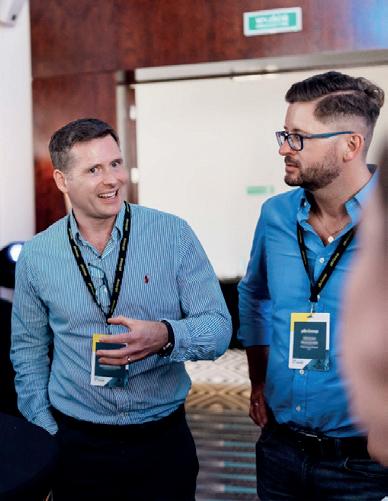


Universities often highlight their prominence on the global stage to demonstrate their impact, value, and importance. While this international role is vital, it is within their own local areas that universities can and should make the most direct and lasting difference.
Our universities are active agents of social mobility, opportunity, and regeneration
In recent years, the civic engagement agenda in higher education has grown significantly, as universities across the country build stronger strategic links with local stakeholders. These partnerships are increasingly advancing the social and economic goals of the communities in which they are rooted. Yet, what civic engagement looks like in practice – and how it best supports those from disadvantaged backgrounds –remains at an early stage. What is clear is that there can be no ‘one size fits all’ approach. Each place has its own challenges and opportunities, requiring universities to respond in ways that reflect the specific needs of their communities.
At the University of Salford, our civic role is central to our Innovating to Enrich Lives strategy. We are committed to working with partners to improve life chances for people from all backgrounds. Through philanthropy, we help raise aspirations and attainment, including supporting local schoolchildren via our partnerships with The Tutor Trust and Into University. In 2024, we were ranked fifth best in England in the Higher Education Policy Institute’s Social Mobility Index.
We are also proud to champion Salford City Council’s ambition to become a Child Friendly City, ensuring children are safe, supported, and heard. We see ourselves not only as a university for our students, but as a catalyst for positive change across the Salford community and beyond. Looking ahead, we have an ambitious capital expansion programme which will deliver new buildings, open up our campus to the local community, and drive economic regeneration. Our new Social Innovation Institute will also bring together researchers, policymakers, and practitioners to deliver world-class work with tangible, lasting impact on society.
In London, the higher education landscape looks very different. Unlike many other cities and towns, there is no single ‘anchor’ institution. Instead, the capital is home to over 40 universities and many smaller providers. At the University of West London, we have focused our efforts on Ealing and Hounslow – where our campuses are based – to build close partnerships with local authorities.
With Hounslow in particular, we have placed access to higher education and social mobility at the heart of our collaboration. In contrast to much of London, some parts of Hounslow have participation rates below the national average. In response, we are launching a new ‘Communiversity’ campus in Feltham in 2026, providing short, flexible, and intensive courses that meet the needs of local people and employers.
Together, these examples show how universities are redefining their civic mission: not only as places of research and learning, but as active agents of social mobility, opportunity, and regeneration. By working in deep partnership with local communities, universities can deliver impact that resonates far beyond their campuses – creating more inclusive, thriving societies and ensuring that higher education truly serves the public good.


People across Kent and Medway will soon benefit from more joined-up and locally delivered mental health care, thanks to two major developments announced today by the county’s mental health trust.
From spring 2026, Kent and Medway NHS and Social Care Partnership Trust (KMPT) will take on responsibility for all-age eating disorder and children and young people’s mental health services across the county. These are currently provided by North East London NHS Foundation Trust (NELFT), who are working closely with KMPT to ensure a well-planned transfer.
It means that, for the first time in Kent and Medway history, NHS mental health care will be delivered by a single, local provider for people of all ages –making it easier for them to access and navigate care throughout their mental health journey.
For patients and families currently receiving care, the same teams will continue to provide support in the same places, using the same contact details. Conversations are underway to offer reassurance and answer any questions.
KMPT will also open Kent and Medway’s first-ever NHS Psychiatric Intensive Care Unit (PICU) solely for women, based in Dartford, next Spring. The new 10-bed ward will provide specialist, short-term, highintensity support for women experiencing the most serious mental health crises – allowing them to be treated closer to home, family and support networks, which is known to support treatment and recovery.
Sheila Stenson, Chief Executive of KMPT, said: “Mental illness doesn’t follow age boundaries or system structures, but until now, no single local NHS trust in Kent and Medway has supported people right across their mental health journey. Everyone involved agreed this needed to change, and we are working closely together, as one NHS, to make this happen from next Spring.
“I’m also incredibly proud to create Kent and Medway’s first PICU just for women. As soon as I became CEO I knew that this had to change. It will make a real difference to the women, and their families, who need its help.
One of our obligations as an integrated care board is to support our local economy
“Both of these developments are about building a stronger, more inclusive mental health system – one that helps people not just live with serious mental illness, but live well.”
The transfer of services from NELFT will include both community and inpatient care, including the Kent and Medway Adolescent Hospital.
Chief Executive at NHS Kent and Medway Paul Bentley said: “NHS Kent and Medway Integrated Care Board has awarded KMPT a single integrated contract for adult, children and adolescent mental health services, including the all-age eating disorder service. I would like to thank both KMPT and NELFT for their commitment to working to bring Kent and Medway’s children, young people’s and adult mental health services together.
“Children and young people will still see the same teams, in the same places, and should they need support into adulthood, they will have the opportunity to continue their care with KMPT, an organisation they are already familiar with.
“One of our obligations as an integrated care board is to support our local economy, as well as being the right thing for service users, this step will do that.”
Both announcements are part of KMPT’s long-term ambition to improve access, reduce fragmentation, and deliver the right care, in the right place, at the right time. They reflect a shared ambition across the NHS to support local decision-making and ensure high-quality mental health care.
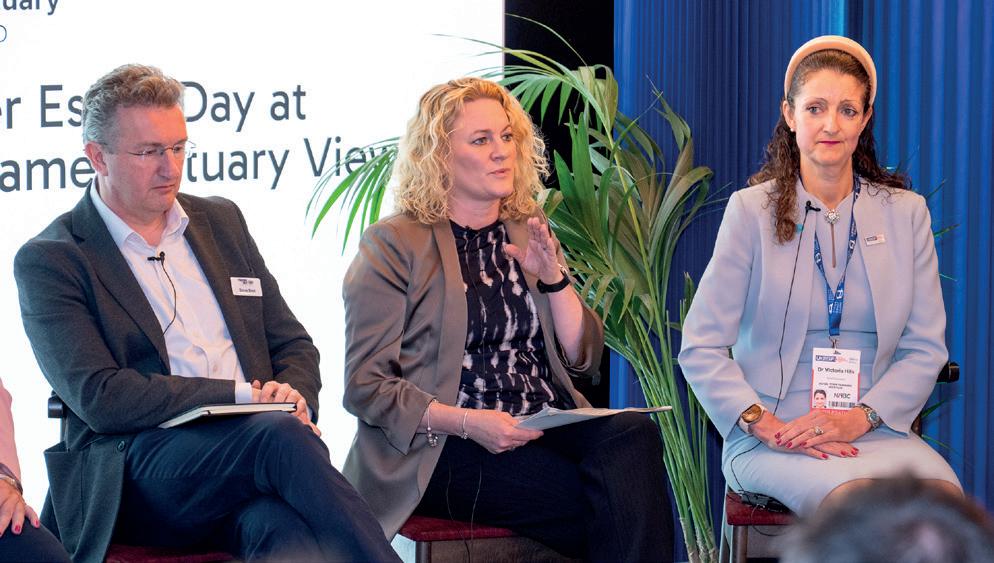
Essex is undergoing a transformation. With a £26 billion infrastructure pipeline and over 210,000 new homes planned, the county is poised for unprecedented growth - but ambition alone isn’t enough.
Through targeted sector development and inclusive employment programmes, Ambitious Essex is ensuring that opportunity reaches every corner of the community. Led by Essex County Council, Ambitious Essex is a business support service focused on unlocking sector growth and inclusive employment through strategic partnerships and targeted interventions to support more people accessing opportunities.
A key pillar of this effort is the construction sector. With over 58,000 people already employed and 650,000+ homes needing retrofitting, demand is surging. Essex will need 12,900 additional construction workers by 2031. To meet this challenge, Ambitious Essex is delivering a suite of sector growth initiatives designed to unlock potential and remove barriers.
Building a Lasting Legacy - a Construction Careers Programme co-delivered by Morgan Sindall Construction, Greater Essex Careers Hub and Ambitious Essexis designed for longevity, not a one-off intervention. Working with Year 9 students throughout their school journey, it offers tailored career pathways into carpentry, plumbing, civil engineering, electrical installation and digital design using computer-aided design and building information modelling. A step towards solving tomorrow’s skills gaps: by cultivating high-quality, home-grown talent to power the county’s construction ambitions.
The Essex Supply Chain Portal is a digital platform connecting local businesses to major development opportunities.
Further initiatives include a regional skills analysis and location-based mapping programme to identify workforce gaps, a business support offer tailored to SMEs adopting modern methods of construction. The Essex Supply Chain Portal is a digital platform connecting local businesses to major development opportunities. A job brokerage service is also matching employers with site-ready talent, expanding access to the labour market to include those who demonstrate the aptitude and determination to succeed.
But sector growth is only part of the story. Ambitious Essex is also championing inclusive employment through innovative partnerships, most notably, the 2024 NHS care leavers programme. In collaboration with Mid & South Essex NHS Foundation Trust, the programme offered nine care leavers aged 18–24 six months of paid work across hospital departments. Each placement provided insight into NHS roles, values and behaviours, while building confidence and transferable skills.
The results speak volumes: all participants were offered roles at the end of their placements. One care leaver shared, “I’ve felt really supported and totally put my trust in my Anchor employment officer. She helped me turn barriers on their head and realise my experience and skills are transferable”.
This model is now being scaled across Greater Essex, with plans to replicate it in other key sectors, including construction. The ethos around this work is not around targets and quotas but supporting more people to reach their ambitions and potential. The goal is clear: to break down barriers, raise aspirations, and create pathways into meaningful work for residents ensuring they can get there on their own merit.

As part of its wider inclusion agenda, Ambitious Essex also supports initiatives like Ambitious Women in Essex, a growing community that celebrates and empowers women in business. Through mentoring, networking and collaboration, the initiative has helped hundreds of women across the county build confidence, forge partnerships and grow their ventures.
Together, these programmes reflect a bold vision for Greater Essex: one where economic growth is matched by social mobility, and where strategic investment is guided by empathy, data and collaboration. Greater Essex is committed to driving sustainable growth through strategic sector development. Our ambition is clear: to build a county where opportunity is embedded, and every pathway leads to progress.

As Open Access rail gains traction in the UK, Stuart Jones, Managing Director of First Rail Open Access, is leading the charge to make it a mainstream alternative to road and air travel.
Jones, a seasoned endurance runner, likens his role to a marathon-demanding, strategic, and all about pacing. His journey began with the commercial groundwork for Lumo, FirstGroup’s low-cost, all-electric service between London and Edinburgh. Today, he oversees a growing portfolio of Open Access operations, including Hull Trains and new ventures under First Rail Stirling and First Rail Wales & Western.
“We’ve proven Open Access works,” Jones says. “It attracts new passengers, lowers emissions, and creates great customer experiences. Now we’re focused on showing how far it can go.”
From Hull to Lumo: A Proven Model
Open Access isn’t new. Hull Trains, launched in 1999, was one of the UK’s first operators, restoring direct services between Hull and London. Under Jones’s leadership, it’s become a model for connecting underserved routes and growing the market.
Lumo, launched in 2021, exemplifies this vision. Designed as a greener, smarter alternative to domestic flights, it quickly gained popularity among budget-conscious, eco-aware travellers. Jones, who wrote the commercial case for Lumo in 2015, says the goal was never to poach passengers but to grow the overall market.
Open Access has always operated without subsidy. That’s a strength - but we need a transparent path to grow
A Different Kind of Leader
Jones doesn’t fit the mould of a traditional rail executive. With a background in maths and management science, he began his career in consultancy, working on major infrastructure projects like Crossrail and HS2. His broad experience across UK and European rail systems gives him a unique perspective.
“Rail is never simple,” he says. “But that’s part of what makes it so rewarding. When you get it right, the impact is huge.”
Outside work, Jones is an avid runner, often training before sunrise. He’s also preparing for a personal milestone-his upcoming wedding in South Africa.
“Running teaches you discipline and resilience,” he says. “Qualities that are essential in leadership.”
Expanding the Network
Jones’s mission is to take Open Access from outlier to mainstream. First Rail has several proposals in motion, including a new service between London Euston and Stirling, set to launch in 2026. The Office of Rail and Road (ORR) recently approved timetable enhancements for routes to Hull, Newcastle, and Glasgow.
Not all bids have succeeded. Proposals for direct services to Sheffield and Rochdale were rejected due to capacity constraints. But Jones remains undeterred. “We’re not giving up on Rochdale,” he says. “We’re exploring other options.”
He’s encouraged by government support and sees Open Access as key to decarbonising transport and growing rail usage. “We’re aligned in wanting to get people out of cars and planes,” he says. “Open Access has a proven role to play.”
Jones believes Open Access’s success lies not just in its services, but in its people. Lumo was built with a fresh approach- offering flexible roles, and prioritising progression. “One of our onboard ambassadors is now training to be a driver,” he says proudly.
Lumo proudly recruits a significant majority of its colleagues from outside of rail and has received accreditation for deploying such an inclusive approach to recruitment. As part of this, the operator recently welcomed onboard a former Coronation Street Art Director as an Apprentice Customer Driver, as part of recruitment for new daily services between London Euston and Stirling.
This ethos is spreading across First Rail’s Open Access division. Local sourcing, partnerships with tourism boards, and community engagement are central to the model. “We want our services to feel like they belong to the places they serve,” Jones says.
Looking Ahead
Jones sees Open Access as uniquely suited to modern passenger needs: low-emission trains, simple fares, digital-first booking, and strong local identity. But he stresses the need for fair access and integration into the future Great British Railways (GBR) framework.
“Open Access has always operated without subsidy. That’s a strength-but we need a transparent path to grow,” he says.
With Lumo’s success-high customer satisfaction, reduced domestic flights, and no taxpayer costJones believes the model is more relevant than ever.
Local rail operator c2c is delighted to announce that its involvement with the Rail Safe Friendly programme has had a social value impact of over £1.8 million in c2c’s local communities.

I’m really proud to be a Rail Safe Friendly Ambassador. Having sponsored 100 schools last year – and another 150 up and coming this year to reach ‘Gold Standard’
The Rail Safe Friendly (RSF) programme is dedicated to spreading the vital message of rail safety among young individuals, educators and parents throughout schools in the UK. c2c supports the mission of the RSF that every child should be equipped with the essential knowledge to navigate the railway environment safely.
As part of our commitment to community, safety and schools in our local communities, from July 2023 –April 2025, c2c is proud to have helped deliver vital rail safety sessions to 87 different schools, reaching over 60,000 people.
c2c Managing Director, Rob Mullen, said: “c2c is a community railway and we understand the impact we can have on young people by supporting the Rail Safe Friendly programme. We are committed to keeping children safe when using the railway and by going into schools and educating them on the potential risks and dangers, we can help ensure that everybody gets home safe.”
The response to the sessions from the schools has been overwhelmingly positive.
At Westcliff High School for Girls, students were ‘fully engaged and visibly moved by the session.’ School staff noted a clear improvement in awareness and suggested including tips on behaviour in stations and trains, as well as PSHE topics like mental health and respect for others.
Harold Wood Primary pupils asked thoughtful questions about electrified tracks and station safety. Teachers praised the session’s impact.
At The Willows Primary school, children engaged well and showed a good understanding of existing safety rules, while staff felt the video clearly communicated the dangers.
Recently, c2c Head of Revenue Protection and Security, Iain Palmer, became a Rail Safe Friendly Ambassador – making him the first RSF Ambassador to come from a UK Train Operating Company (TOC). c2c Head of Revenue Protection and Security, Iain Palmer, said:
“I’m really proud to be a Rail Safe Friendly Ambassador. Having sponsored 100 schools last year – and another 150 up and coming this year to reach ‘Gold Standard’ – this partnership sees tens of thousands of students in our local communities educated in railway safety. That can only be a good thing and I urge any interested companies to get involved as well.”
Rob Mullen added: “I’d like to congratulate Iain on becoming the first RSF Ambassador to come from a UK TOC. Iain’s dedication to ensuring children and young people stay safe when using the railway typifies the core values everybody here at c2c has.”


A new report from Barclays LifeSkills is calling on the Government to make core, transferable employability skills a core part of the school curriculum to better prepare young people for the world of work. Published in May 2025, Workforce Ready: supporting young people with the employability skills that businesses need for growth, shines a spotlight on the growing disconnect between what businesses need and how young people are being prepared for employment.
Despite a rapidly changing economy and growing labour shortages, 60% of employers report that school leavers lack the core employability skills needed to thrive at work such as communication, leadership, resilience and problem-solving. The report finds that fewer than half of young people say they feel confident in their skills and just 34% feel their school helped them to develop them.
Barclays, which banks over a million UK businesses, draws on over a decade of experience through its flagship Barclays LifeSkills programme. LifeSkills has reached millions of young people and has been used in over 94% of UK secondary schools. It provides practical tools and training to help students build essential workready capabilities.
Kirstie Mackey OBE, Managing Director of Citizenship UK & Europe at Barclays, said:
“More needs to be done to support young people whilst they are in education to halt the rise in youth unemployment and to provide employers with a rich talent pool of work-ready employees, who are not only academically qualified but also resilient, adaptable and confident. Core, transferable employability skills are not a ‘nice to have’ they’re essential. Our learnings through Barclays LifeSkills show us that evolving education policy is going to be vital to improve the employability of young people.
The Workforce Ready report proposes five key policy changes, including a standardised skills taxonomy recognised by both educators and employers, embedding employability skills into the national curriculum, reforming Ofsted’s inspection framework to assess work readiness, and using pupil premium funding to support disadvantaged students with tailored skill-building support.
The report also highlights the particular challenges faced by disadvantaged young people, who often lack the confidence, support, and extracurricular opportunities to develop these vital skills. Without intervention, they risk being left further behind.

Rt Hon Justine Greening, Chair of the Purpose Coalition, welcomed the report’s findings and called for cross-sector action:
“Barclays is absolutely right to highlight the importance of employability in education. The life chances of too many young people are still dictated by their postcode. Equipping every student with the skills and confidence to succeed in work is one of the most powerful levers we have to drive social mobility and boost growth across the UK.”
The report comes at a crucial time as the Government reviews its Curriculum and Assessment strategy and Ofsted inspection framework. Barclays hope is that its insights will inform and inspire workable and systemic change.
For more information and to read the full report, visit: home.barclays/insights/2025/05/work-readysupporting-young-people-report/

The UK’s seaside resorts attract over 100-million-day trip visitors per year proving that despite foreign travel becoming more accessible all the time, many of us still like to visit the coast.
As well as being magnets to tourism our coastal communities are havens of natural beauty and homes for emerging industries such as renewable energies. But alongside these strengths sit high levels of poverty, poor health and low social mobility.
At the Ruskin Institute for Social Equity (RISE) based at Ruskin College Oxford we have been tracking changes in higher education participation for those from lower socio economic backgrounds at local authority level over recent years using data from the Department of Education. Our 2025 report ‘Coast and Country: Access to higher education cold spots in England found that higher education participation for young people who are eligible for free school meals is 21% - which is 8% below the national average.
The implications of only a small minority of local young people from low-income backgrounds progressing to higher education in coastal communities is profound. It means professionals across the public sector and private sector employers who need a degree have to be imported in. The continual graduate skill shortage acts as a brake on economic growth and on the ability of education and health services to meet local needs. It also limits the ability of coastal economies to diversify their economies and add new industries to their traditional strengths. These challenges mean social mobility is as much a social as an economic imperative in coastal communities.
As yet the Labour government has been far more muted than its predecessors where social mobility is concerned. There has been growing and welcome return to a place-based approach to widening access to higher education, but this is in the context of an Opportunity Mission that focuses much of its efforts on early years.
In contrast, some businesses have also been working with other stakeholders in coastal areas to try and drive progress most notably via the Business in the Community initiative, in places like Blackpool.

However, much more has to be done here to focus specifically on social mobility in coastal communities.
Our research described above also showed that even after controlling for attainment, higher education provision has a significant impact on participation in these areas. Investing in new kinds of universities in partnership with existing providers built around access and lifelong learning could have a transformative effect on social mobility and the local economy in many coastal areas.
Labour has also been relatively conservative where devolution has been concerned so far focusing on extending and deepening the mayoral model. It could be far more innovative and piloting new ways of devolving education funding and power to local consortia in coastal areas. As it enters its second year the Labour government is under pressure to prove that it understands regional inequality and has a plan to address it. Coastal communities are a good place to start.
By
Professor Graeme Atherton, Associate Pro-ViceChancellor (Regional Engagement) at the University of West London, Vice Principal of Ruskin College and Head of the Ruskin Institute for Social Equity (RISE)

Stephen Morgan MP, Minister for Early Education, has visited the University of Southampton and heard how researchers are helping to improve long-term health prospects for children.
Joined by MP for Southampton Test, Satvir Kaur, the Minister spoke to school pupils taking part in a hands-on session at LifeLab , a unique research-based educational project helping children and young people understand the science behind health messages.
He also heard from Southampton scientists using big data on pregnancy and early life to predict the risk of children developing overweight or obesity as they grow up.

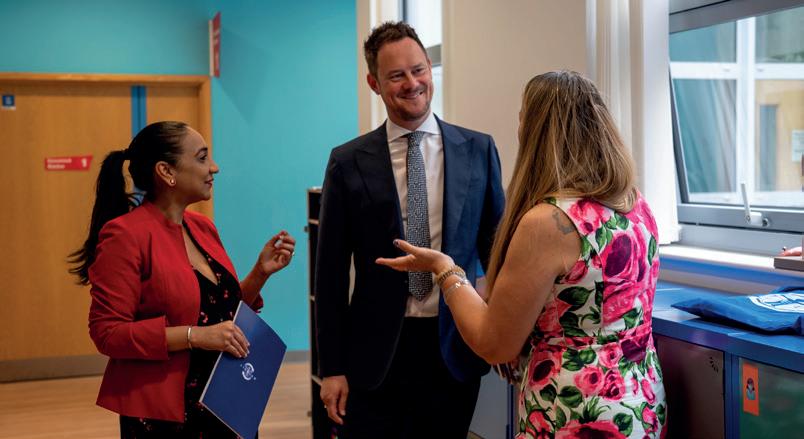
Commenting on the visit, Stephen Morgan said:
“It’s been brilliant to see the impact of the innovative work to improve child health being driven by the university.
“Through our Plan for Change this government is determined to give every child the best start in life, which includes creating the healthiest generation of children in our history.
“As we roll out free breakfast clubs across the country and make free school meals available to all households on universal credit, we will continue working alongside experts and the sector to build a healthier future for generations to come.”
During his tour of LifeLab, the Minister joined children from King’s Academy Bay House School, Gosport as they explored how factors such as diet, physical activity and sleep can affect their health and wellbeing. He mixed with the secondary school students and got involved with activities in the lab, such as taking blood pressure and monitoring heart rate.
LifeLab is a collaboration between the University of Southampton, the NIHR Southampton Biomedical Research Centre (BRC) and University Hospital Southampton. The programme is linked to the school curriculum and over the last twelve years has worked with more than 17,000 secondary school students from over 120 schools.
As well as hosting secondary school children in its teaching laboratory at Southampton General Hospital, the project also runs Early LifeLab, an in-school programme which is now in over 40 percent of the primary schools in Southampton, reaching more than 6,500 children.
LifeLab Director Professor Kathryn Woods-Townsend said: “We were delighted to welcome Mr Morgan to LifeLab to see first-hand the interactive way we engage young people with the science behind the health messages, so they have the skills and knowledge to be able to make healthier choices. We believe that supporting young people to lead healthier lives will not only positively impact them now, but also their future selves and their future children.
“It was good to see the students show Mr Morgan the ways the programme has helped them reflect on how they can make informed decisions about their own lives.”
Stephen Morgan also heard from Professor Nisreen Alwan , Professor Simon Fraser and Dr Nida Ziauddeen about their study aiming to identify, through data collected during pregnancy and early childhood, whether a child is at risk of obesity in later life. They’ve devised a prediction model to estimate the risk of obesity at primary school. It will help provide targeted interventions which could assist families, nurseries and schools in mitigating the risk of children becoming overweight.
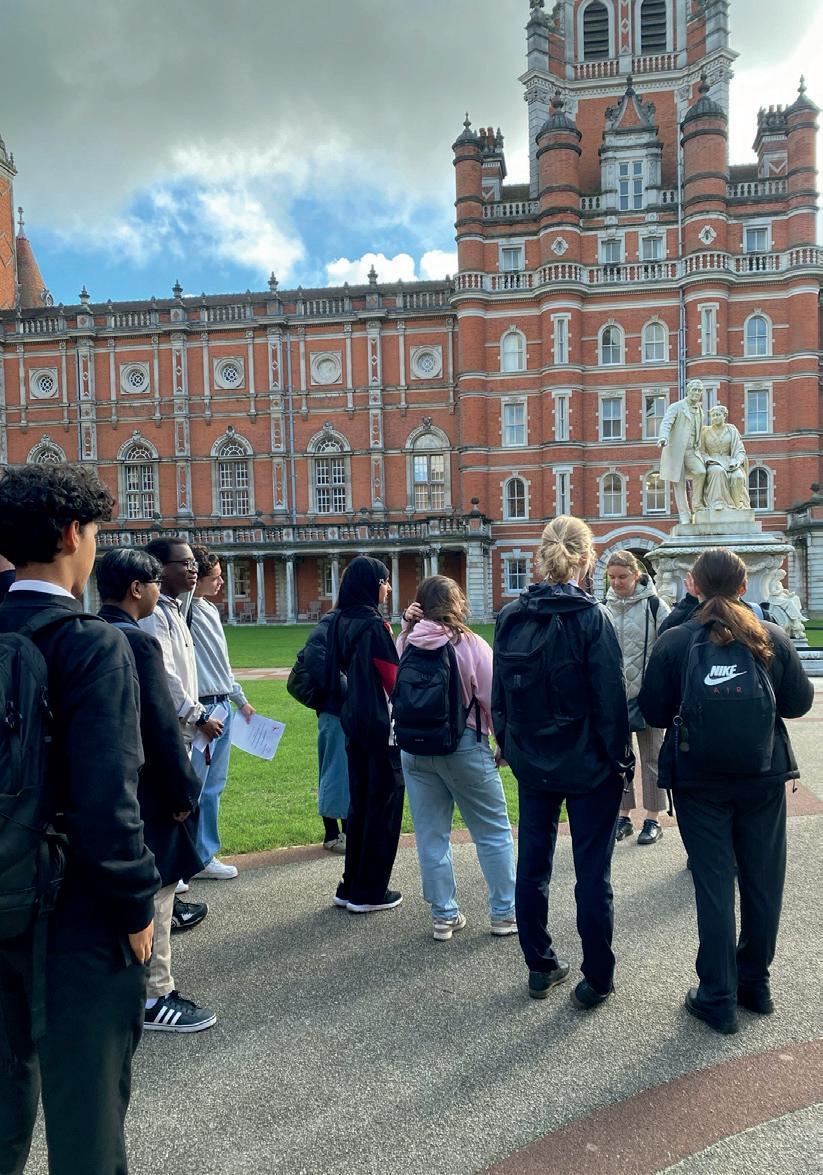
Language skills open doors and break down barriers. And yet, the provision of modern language education in our schools and universities is becoming increasingly uneven. Access to this education is becoming more of a postcode lottery, and a question of privilege.
At Royal Holloway – a university with real breadth and depth of expertise in language teaching, learning, and research – a spark formed at the intersection of this expertise and our drive as a university of social purpose. What if, rather than approaching the social imperative to widen access to higher education and the decline in modern language study as distinct challenges, we focused on the opportunity there? What if we could find ways for modern language study to mobilise, motivate and support more students, from more diverse and less privileged backgrounds, to pursue higher education?
This is what led us to collaborate with the Reach Foundation on its innovative ‘Languages For All’ (LFA) initiative. We have partnered on LFA – a non-profit programme of the Reach Foundation which addresses the decline in language study within UK state schools – since 2022, and continue to deliver the pilot scheme in Hounslow. Over this time, the number of schools in Hounslow offering modern languages has tripled, and A-level enrolment in these subjects has more than doubled.
These results matter. They benefit individuals and communities in multiple ways: from global career and growth opportunities to building intercultural understanding locally and nationally.
They also evidence what we can achieve when we seek collaborative, place-based solutions to the challenges we face. As a model, LFA works because it engages with multiple barriers to access and is sensitive to local and regional conditions. Through regional hubs that foster strategic partnerships between schools, universities, employers, and international cultural bodies, we’re overcoming key barriers – such as the high cost of offering small A-level language classes and misconceptions regarding language study and career prospects.
It also helps to unlock funding by articulating the ways in which modern language provision can serve the needs of a particular community, and the strengths of the organisations like universities that will deliver it. Royal Holloway brings deep subject-level expertise in modern languages and is organised around strategic priorities around widening access and being civic-minded, globally engaged – so, work is partly supported through Access and Participation Plan funding, as well as the Reach Foundation. This is what works for us and our local communities right now –but the model is agile enough to change over time.
As a University of Social Purpose, this approach aligns directly with our values and ambitions. Through innovative thinking and action we’re opening the doors to more, high-quality language learning opportunities for more young people regardless of their background – breaking down barriers and inspiring them to engage with their local and global communities.

The NSPCC will be hosting this timely panel event with This is Purpose at Labour Party Conference on Sunday 28 September 2025, 10:30am-11:30am
The government has set a welcome and ambitious target to halve violence against women and girls (VAWG) in a decade and made tackling VAWG a central pillar of their Safer Streets Mission – one of six key missions that form the central building blocks of Labour’s ‘missionled Government. They will be publishing a new VAWG strategy in the autumn to outline the steps they believe will help them achieve this.
Concerningly, it appears that these commitments – and any funding attached to them - will not include a focus on tackling child sexual abuse. This is despite the fact that children are disproportionately victims of sexual offences – particularly those perpetrated online.
NSPCC research has found that 80% of online grooming crimes are committed against girls (2023/24) and recently the Internet Watch Foundation highlighted that 97% of child sexual abuse images they found in 2024 involved girls only. Each year it is estimated that 500,000 children experience sexual abuse and this is likely to be a significant underestimation. We cannot meaningfully make progress on tackling and preventing VAWG unless we fully address the disproportionate harms experienced by children both on and offline.
VAWG and child sexual abuse are also inherently and deeply connected- with shared root causes like gender inequality, misogyny and power imbalances making a co-ordinated and joined-up response essential.
With a siloed approach to different forms of abuse emerging within national policymaking and commissioning, there is an increasingly important role for local councillors, Police and Crime Commissioners, and local services in looking holistically at how to tackle the harms experienced by women and girls. That’s why the NSPCC is hosting this panel event: to spotlight the crucial role of local action on VAWG in addressing the full spectrum of harms experienced by children and to bring together key decision makers who can help drive change for children. The Panel will explore how local leaders can develop and refine their VAWG strategies to centre the experiences of children, contribute to the prevention of child sexual abuse, and deliver the support children need.
From an NSPCC perspective, this must include equipping local agencies and people working with children with the knowledge, skills and confidence to recognise and respond to abuse. Professionals routinely contact the NSPCC Helpline seeking advice about clarifications on different types of abuse and raising concerns about barriers to supporting children effectively. Numerous reports, including the Child Safeguarding Practice Review Panel’s recent review into child sexual abuse within the family environment have found that practitioners working with children and families have not been equipped to identify and respond confidently to child sexual abuse concerns.
It also means showing leadership through putting in place effective local prevention strategies, including working with other local agencies to share information around children at risk.
Too often, children’s online experiences are kept at a distance in local and national conversations about child sexual abuse, with concerns that it is too complex or challenging to properly protect children in these spaces. It is crucial that commissioners and practitioners – in their local strategies - can support children to navigate the online world, promote vital safety tools, and integrate a strong understanding of online risks and the impacts of online abuse across training and practice, so that our approach to prevention, protection and support is meaningful across all part of children’s lives.
Effective and sustained local leadership also transforms the way in which children are supported in the aftermath of abuse, not only by improving the local response to incidents of child sexual abuse but also prioritising children in local commissioning strategies to increase access to specialist support. This is critical given the growing evidence about the dearth of support for child victims and the financial fragility of specialist services operating in this space. The Centre of Expertise on Child Sexual Abuse’s (CSA Centre) latest report, for example, found an estimated 55,000 adults and children in England and Wales are currently on waiting lists and that 23 support services had closed in the previous 18 months with many more facing financial uncertainty.
Locally elected officials are in a unique position to act as champions for children in their local areas, and to work with Government to ensure its focus on VAWG genuinely tackles the disproportionate harms experienced by children - both on and offline –every day and galvanises the art of the possible.
Join us at Labour Party Conference on Sunday 28 September, 10.30am to 11.30, to take part in this important debate. For more details about the event, please contact: Rani Govender, rani.govender@nspcc.org.uk.
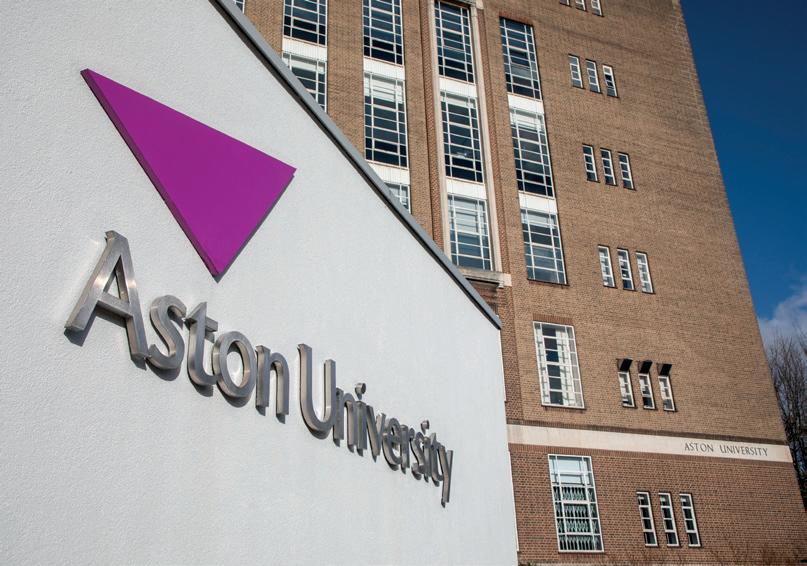
As the UK faces economic challenges and persistent regional inequalities, Aston University is proving how higher education can be a force for social mobility and economic renewal. Rooted in Birmingham’s industrial heartland, Aston has redefined the role of universities, moving beyond traditional academic confines to become a driver of opportunity and innovation.
A model for inclusive growth
Aston’s approach is built on the quadruple helix model, which unites academia, industry, government, and society to address real-world challenges. This framework underpins every aspect of the university’s operations, including transformative initiatives such as the Birmingham Innovation Precinct and Aston’s global education hubs in India, Singapore, and Dubai.
The university generates over £1 billion annually in economic value, with plans to double this by 2030, demonstrating its commitment to transforming lives through education and enterprise.
Social mobility in action
Ranked second in England for social mobility (HEPI 2024), Aston University serves a diverse student community, with 45% coming from widening participation backgrounds.
But its mission goes beyond access, it’s about outcomes. Aston is committed to ensuring graduating students are equipped to succeed. This is reflected in its top-20 ranking for employability and graduate salaries (LEO 2025), with alumni leading global firms, launching startups, and shaping public policy across continents.
Bridging education and employment, Aston’s industry-embedded education model is a cornerstone of its success. Around 70% of undergraduates undertake work placements, with one in three securing a job offer from their placement employer before graduation. Programmes like Aston Power Skills and Aston Global Advantage equip students with skills critical to the future of workAI and digital, environmental sustainability, innovation and entrepreneurship, and inclusive leadershipensuring they graduate prepared for a competitive global economy. Aston is also the first university to guarantee internships for all master’s level students.
Higher education can be a powerful force for change: one that transforms lives, strengthens communities, and builds a brighter future for all.
Driving innovation and enterprise
Critically, the university’s impact extends beyond education. Through initiatives like SPARK The Midlands and over 40 active Knowledge Transfer Partnerships, the university supports high-growth sectors such as HealthTech, CleanTech and advanced manufacturing. Its leadership in the West Midlands Investment Zone and the development of the Green Energy Centre – set to make Aston the first university in the UK to achieve net zero by 2028 – highlight its role as a civic anchor institution and innovation catalyst in the region.
A blueprint for the future
Aston University offers a compelling model for how higher education can drive inclusive growth and socio-economic transformation in partnership with business, government and community. As the UK seeks to close regional inequalities and build a future-ready workforce, Aston’s example shows that universities can be engines of opportunity and innovation. It’s a reminder that with the right vision, higher education can be a powerful force for change, one that transforms lives, strengthens communities, and builds a brighter future for all.

The UK is facing a cardiovascular disease (CVD) crisis. It is one of the UK’s biggest killers, but in many cases, is largely preventable. One of the major drivers of CVD is diabetes, which is a serious yet hidden condition.
With 1 in 5 adults now living with diabetes or prediabetes in the UK and premature cardiovascular deaths rising for the first time in 50 years, these closely-linked health conditions - which also have many shared risk factors - are increasingly affecting the health of the nation. They’re also affecting the economy – every year, the NHS spends around £12bn on treating CVD, and the wider cost to the economy is £30bn.However, the burden of these diseases isn’t shared equally. People living in the UK’s most deprived communities are being disproportionately affected.
CVD is the single biggest contributor of the life expectancy gap between the richest and poorest areas in England, and those in deprived areas are twice as likely to develop type 2 diabetes. Among children, this risk is five times higher.
The need for urgent action to address these conditions has never been greater. Leading health charities like British Heart Foundation (BHF) and Diabetes UK have long called on Government to commit to a dedicated plan to tackle CVD and its risk factors.
The Government’s recent commitment to develop a Modern Service Framework for CVD, announced as part of the NHS 10 Year Health Plan, is therefore a promising step forward. Past frameworks have shown their potential to set clear standards and promote evidence-based care, leading to measurable improvements in cardiovascular outcomes. If designed and delivered effectively, this new Framework could help people live longer, healthier lives, drive growth, and address deep-rooted health inequalities.
The stakes are incredibly high. CVD is the fifth most commonly-reported condition among people economically inactive due to poor health in the UK. And in 2024, there were 36,000 people out of work due to long-term sickness primarily due to their diabetes, a 50% increase since 2019. Furthermore, economic inactivity due to long-term sickness shows stark regional disparities across the UK. Addressing the causes and impact of these conditions is not just a health priority –it’s central to the Government’s Missions.
It’s essential, therefore, that the Framework reflects a long-term commitment to addressing inequality as well as a commitment to improve CVD outcomes. Labour’s manifesto ambition to halve the gap in healthy life expectancy between the richest and poorest regions in England is contingent on tackling CVD and its drivers, including diabetes.


The Framework must also be person-centred and collaborative, with clear accountability. BHF and Diabetes UK will support its development, and urge the Government to work closely with charities and sector partners to ensure it reflects the full patient pathway from prevention through to treatment, as well as the diverse experiences of those it aims to support – especially those for whom the weight of these conditions is felt most acutely.
This is a landmark opportunity – not just to improve outcomes for people whose lives are affected by CVD and diabetes, but to build a healthier, fairer, and more productive nation. If delivered with ambition and commitment, the Modern Service Framework can be a catalyst for change, benefiting patients, communities, and the NHS for years to come.

Young Enterprise is a national financial and enterprise education charity. We are passionate about developing the financial capabilities and enterprising mindset of the next generation, and believe that increased access to meaningful opportunities, combined with ongoing support, can change young people’s futures.
How would you sum up Young Enterprise’s commitment to social mobility, and why does it matter now more than ever?
Sarah Porretta, Chief Executive Officer at Young Enterprise: At its heart, what we do is give young people the skills, confidence, and experience to see what they’re capable of - and to believe they can go further. Our programmes are designed with those facing the biggest barriers in mind, often in schools where resources are stretched.
Our flagship Company Programme, for example, involves around 10,000 students every year. They set up and run a real business, which not only gives them hands-on experience but also helps them develop teamwork, negotiation, and project management skillsthings that make a real difference when they step into the job market. Ultimately, giving some of the tools required to be socially mobile.
Right now, social mobility is high on the national agenda, and with good reason. We’re not making the most of the talent that exists across all parts of society. If we want a genuinely equal and prosperous society, where everyone
can contribute to the economy, to communities, and to the country as a whole, then we have to make sure opportunity isn’t dependent on where you’re born or what your parents do.
Has there been a moment at YE that really stayed with you?
Sarah: Absolutely. In my first week, I saw a study from Denbigh High School. There was a group of about 15 boys who were at serious risk of being excluded, and there is a rich body of evidence that shows the extremely poor outcomes that face a child who is excluded. Some brilliant teachers decided to run our Company Programme during class time, and it completely shifted the dial for these young boys.
Their attendance improved, their relationships with staff got better, and, most importantly, they discovered something they were good at-and were respected for. Suddenly, they had a reason to turn up to school, and some reported that they were too busy creating and selling their products to cause trouble. It was such a clear, tangible example of the power of this kind of opportunity.
What sparked your own passion for social mobility?
Sarah: I’m a product of it, really. I benefited from the Assisted Places Scheme, which ran from 1980 to 1997 and allowed children from low-income families to attend private schools. For me, although I only went for sixth form, it was a turning point and opened my eyes to the kind of opportunities some young people get.
I found my voice, got involved in lots of extra curricula activities, team sports, and gained the confidence to put myself forward. I was the first in my family to go to university-my parents left school at 16 and 18-so I know firsthand how access to opportunities outside the classroom can change your trajectory. Sometimes, you need someone to see more potential in you than you see in yourself. I definitely had teachers throughout my years of state school that did exactly that, and to then have the opportunity to stretch myself throughout sport and other activities at the end of my school years, added that extra edge. But you shouldn’t need to go to private school to get these opportunities: all young people should have access to them. That is what drives me.
For businesses that want to support young people, what’s one thing they can start doing today?
Sarah: National Grid, one of our partners, is a great example of a cutting-edge approach to social mobilitythey are seeking to engage the most marginalised young people in society and offer workplace visits, then placements and internships, so young people can see the full range of roles and actually progress through them. It takes commitment to run something like that consistently, and break down the barriers you meet along the way, but it’s worth it. One young man at a recent event shared his story, beginning in a YMCA, on the brink of homelessness, and now leading the social mobility steering group at National Grid with a successful career ahead of him.
For smaller businesses, it could be as simple as mentoring, giving a talk at a local school, or offering a one-off workplace visit. Any contact helps. And flexibility and empathy is key-young people who have faced multiple barriers and lack a strong support network don’t arrive in the workplace as a “finished product.” Employers need to think about how they can meet them where they are and help them grow.
Social mobility isn’t just about grades or exams. It’s about making sure every young person - no matter where they start - has access...
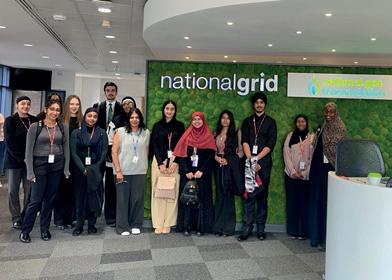
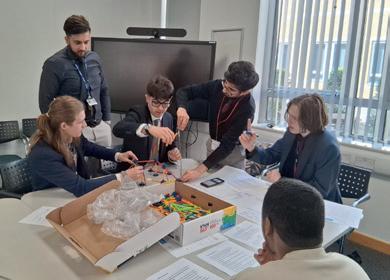
What do young people most need today to thrive?
Sarah: Opportunity. They already have the ambition and the drive-they just need the doors to be opened. We should expect them to be brilliant, because they are.
Any final thoughts?
Sarah: Social mobility isn’t just about grades or exams. It’s about making sure every young person-no matter where they start-has access to the experiences, encouragement, and role models that help them see what’s possible, and giving them the tools to get there.

Marco Forgione, Director General, Chartered Institute of Export & International Trade
The past five years have seen unprecedented change and disruption in the global trade network. Against this backdrop, the UK stands as a connector, bridging systems, and alliances old and new. “Global Britain” must now mean something practical: forging relationships, shaping standards, and upholding the values of trusted trade.
Businesses worldwide face growing uncertainty about trade relationships, supply networks, shipping routes, and long-established rules of commerce. The administration in Washington has very deliberately set on a path to unpick the global, multilateral system.
Combined with geopolitical conflicts, climate disruptions affecting key trade routes, technological upheaval, and shifting regulations, these forces have led many businesses to pause expansion plans.
Alongside these challenges, we’re seeing a shift towards economic nationalism, fuelled by protectionist self-interest. The UK is emerging as a counterbalance to these trends. Trade agreements with India, the US, and the EU offer an alternative, positioning Britain as an open, outward-looking, and collaborative partner.
Trade is not an abstract concept, and isn’t just a part of our economy. Trade is what enables humanity to grow, this is our chance to champion a model of trade that’s open, responsible, and inclusive
Far more than just an economic tool, free and open trade drives peace and prosperity. And all the evidence shows that businesses which trade internationally are more resilient, more sustainable, create more jobs, and are more profitable.
The moral case for trusted cross-border trade is clear: history shows trade reduces conflict, promotes diplomacy, and boosts development.
The 19th-century economist Frédéric Bastiat was right that “when goods don’t cross borders, soldiers will”. More than a billion people have been lifted out of extreme poverty since 1990, largely thanks to open trade.
And here at home, trade’s value to the UK economy cannot be overstated: exports account for about one-third of UK GDP and support over seven million jobs. Trade is the keystone for any economy.
The answer to today’s challenges isn’t to turn inward. Rather, we must build a new framework that counters the tilt toward self-interested economic nationalism, and instead pursue policies that champion economic patriotism: encouraging domestic investment, leveraging national assets, and fostering growth with international partners.
British businesses are already showing what’s possible. Flora Food Group exports to over 100 countries, proof of UK food and drink’s global reach. Joseph Cheney, crafting shoes since 1886, now navigates a complex global supply chain. Lemberg, a caviar specialist operating across the EU, shows the value of clear, efficient regulation for luxury firms. And AESSEAL manufactures critical mechanical seal technology for industries in over 100 markets. Each of these firms, all members of the Chartered Institute, reflects the bigger truth: that trade is an agent of progress.
Our newly independent trade policy is both a freedom and a responsibility. This is our chance to champion a model of trade that’s open, responsible, and inclusive. But we stand at a crossroads: the world can fragment, or it can build bridges. Trusted trade and collaboration are how we achieve sustainable growth that leaves no one behind.
To meet today’s challenges, we must pull down barriers and support trusted trade. At the Chartered Institute, our mission is to do just that, and to counter economic nationalism through economic patriotism. When supply chains are stable and partners are predictable, everyone benefits, from factory floor to end customer.
Trade is not an abstract concept, and it isn’t just a part of our economy. Trade is what enables humanity to grow.

Marie Clarkson, RNIB Employment Manager
At RNIB we’re clear that sight loss shouldn’t be a barrier to finding or staying in work. Yet currently only one in four registered blind and partially sighted people of working age are employed. This should concern us all.
We know many blind and partially sighted people want to work, with 11,000 people with sight loss in the UK actively seeking work. However, inaccessible recruitment processes, ill-informed employers, and poor access to assistive technology are blocking their pathway to finding, securing and being retained in paid employment.
It’s time we fix this and widen the talent pool available to employers and increase diversity and innovation, drawing on the value blind and partially sighted employees bring to organisations and the workplace.
Blind and partially sighted people thrive in almost all employment sectors. Just like everyone else, it comes down to the right support, training, skills and experience for the job. So, what is getting in the way for many people?
We’re seeing fantastic progress, with companies who are transforming their workplaces through inclusive practices.
RNIB’s research found that one-third of people with sight loss who are not in work said the biggest barrier to them getting a job was the attitude of employers. A 2023 YouGov Poll found a quarter of employers surveyed said they wouldn’t be willing to make workplace adaptations and adjustments to employ a blind or partially sighted person. That’s not just ill-informed but illegal under the Equality Act.
The Keep Britain Working review, commissioned by the Department for Work and Pensions, is looking into the role employers need to play in creating and maintaining inclusive workplaces. We welcome the review, which is due this Autumn.
Tackling common barriers to recruiting and retaining disabled people, and those with long term health conditions, is crucial. For this to be achieved employers importantly need to be equipped with the right knowledge and support to deliver accessible and inclusive workplaces. A start would be for the UK Government to signpost employers to the support available from RNIB, including our Visibly Better Employer (VBE) standard.
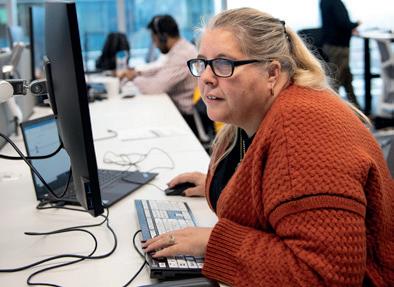
The VBE standard is a framework designed to help employers attract, support, and retain blind and partially sighted employees. Through the standard we examine how inclusive an employer’s practices are for both existing staff with sight loss and potential future applicants. We then provide recommendations for improvement, and, after implementation of suggested changes, employers achieve our Visibly Better Employer status.
We’re seeing fantastic progress, with companies who are transforming their workplaces through inclusive practices. In the past year, Amazon, the House of Commons, Roche Pharmaceuticals, Cadent Gas, the Office for National Statistics, and many more employers have achieved our VBE standard.
Ellyn Fitzgerald, Tesco’s Head of Equality, Diversity and Inclusion shared: “We’re thrilled to have been awarded the Visibly Better Employer standard from RNIB. We’re committed to ensuring that everyone’s welcome at Tesco and that we are doing the work needed to make Tesco a truly inclusive workplace for all. We recognise that people with sight loss face many barriers to success at work, and with the RNIB’s help we are excited to change that for our colleagues now and in the future.”
We look forward to more organisations getting on board.
To find out more and start your journey to becoming a Visibly Better Employer, get in touch with our dedicated team on VisiblyBetterEmployer@rnib.org.uk.


By Sean Duffy, Chief Executive of the Wise Group, and Tracey Burley, Chief Executive of St Giles
Across our justice system one truth is hard to ignore: transactional services don’t reduce reoffendingrelationships do.
Through our values-led partnership, St Giles Wise, we’ve been testing what happens when services are built not on bureaucracy, but trust. Early, consistent, sustained trust. The model is simple: meet people before they fall through the cracks, walk alongside them through the turbulence of release, and connect them to purpose, support and community.
At the core is our Mentoring and use of lived experience in these relationships - a traumainformed, strengths-based approach that sees the whole person. Someone who has been there or has relatable experience themselves really understands how tough it is to come out of prison and navigate the rocky road to resettlement. That individual is ideally placed to help others.
We train them to a professional industry standard so that they can use these skills alongside their lived experience.
We don’t need more diagnosis. We need delivery. The direction is set; the outcomes are within reach. If we know what works, the only question left is: what are we waiting for?
This isn’t a “programme”; it is the foundation that enables sustainable change.
And it works.
We see people reconnect with healthcare, stabilise housing, make progress with addiction recovery and, crucially, begin to believe a different future is possible. These aren’t easy wins; they’re hard-earned changes from people who’ve lived through exclusion, trauma and long-term institutionalisation. But with the right support, they show up. They try. They change.
What we’re learning is clear and compelling:
• Engagement is high - especially among those written off as “hardest to reach.”
• Needs are complex - spanning emotional wellbeing, family, finances and community connection as much as criminogenic risk.
• Outcomes are meaningful - sometimes within weeks: GP registrations, benefits sorted, prosocial routines, safer accommodation.
• Peer support underscored by lived experience is transformative - change is believable when it’s shown by someone who’s been there.
This autumn the Justice Secretary is bringing forward the biggest sentencing shift in a generation: abolishing most short prison terms, toughening community punishments, expanding electronic monitoring and introducing an earned-release model for good behaviour and purposeful activity. The direction is right - but delivery is everything. Positive relationships are the connective tissue that makes these reforms stick in real lives and real places.
We call that connective tissue “justice capital”: the personal, social and community assets that underpin desistance. Binary reoffending stats don’t capture it, but courts, prisons, probation and communities feel it when it’s there - and feel its absence when it isn’t. Justice capital can (and should) be built deliberately into earned-release plans and community sentences, so punishments are tough and purposeful.
System barriers remain: short funding cycles, patchy coordination, and limited pre-release access waste effort and money. But the message is simple: start earlier, design in partnership, and invest in what works.
That’s why we’re taking this conversation to Labour Party Conference. With voices from politics, frontline services and lived experience - and with Lord Timpson, the Prisons Minister, invited - we’ll explore the poverty created by incarceration, the economic potential of rehabilitation, and how a justice system built on trust can serve individuals, families and society better.
What ministers can do now
1. Back presumption-against short sentences with capacity: fund high-fidelity, mentorled community alternatives that combine punishment, rehabilitation and restitution.
2. Make earned-release work: embed lived experience, mentoring and peer support into sentence plans so progress in work, training and recovery is real - not just theoretical.
3. Guarantee pre-release access (at least 12 weeks) and post-release continuity so people don’t fall through gaps on day one.
4. Commission outcomes that matter: sustained desistance and stability (housing, health, income) - not just process metrics.
We don’t need more diagnosis. We need delivery. The direction is set; the outcomes are within reach. If we know what works, the only question left is: what are we waiting for?
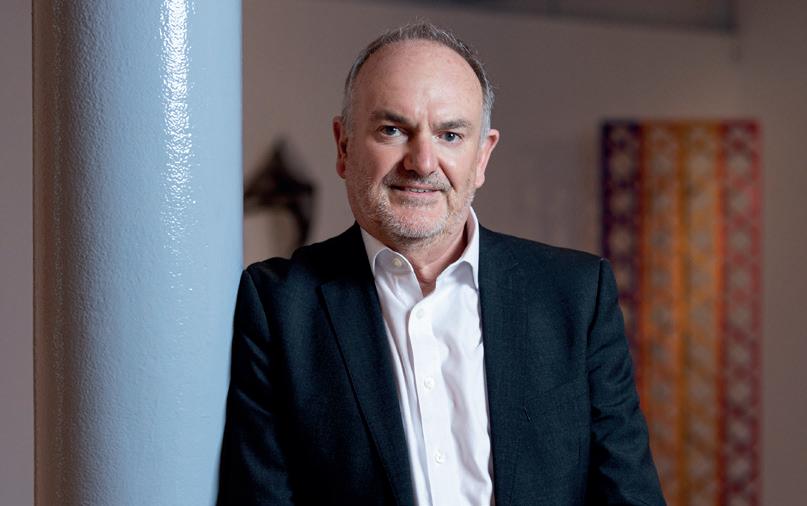
Professor Mark Power
Liverpool John Moores University is proud to be a member of the Purpose Coalition and earlier this year we released our second joint report on breaking down the barriers to higher education.
This is particularly important for LJMU. 45% of our students are from the most deprived areas of the city region and we know that education is the most powerful tool for raising the aspirations of individuals and beyond the individuals to the communities they represent. As an institution we were created to provide opportunities for people from all backgrounds to benefit from high quality education.
And this is at the heart of place-based transformation and how we use our agency and convening power to deliver against the government’s vision and the local city region objectives for inclusive economic growth.
As a key strand of our university strategy 2030, we have a Place and Partnership plan which outlines how we are working in true partnership with industry, education and civic organisations to develop strategies to support inclusive economic growth. As a university, we can do this through innovation delivered through research and knowledge exchange; but more importantly through our people, our graduates.
The plan sets out a series of priorities including strengthening the regional skills base through flexible, responsive, workforce-facing education. Collaborating with local business and industry to drive inclusive economic growth and acting as a catalyst for social inclusion and change for students and communities in collaboration with partners.
Our graduates illustrate the impact of our talent pipeline:
LJMU supplies more graduate employees into the Liverpool City Region economy than any other university (28% of the overall graduate intake)
50% of all employed LJMU graduates start their careers in the city region each year and approximately 70% within the North West.
95% of LJMU students are in employment or further study 15 months after graduating
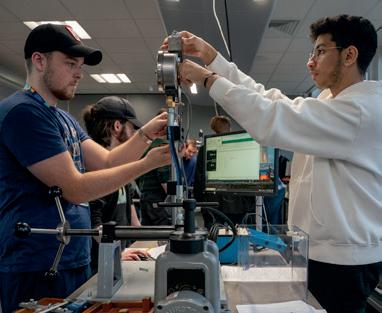
There are more than 250 LJMU graduate start-up firms in the Liverpool City Region.
These are motivated and ambitious graduates and it is our job to make sure that they have the opportunity to realise their potential through developing aspirational career destinations to match their skills.
You will find in this publication an article from Leanne Taher-Bates, our Head of Access and Participation about Levelling the Playing Field for students, staff and communities (overleaf). We are rightly proud of the work we are doing at grassroots level to dismantle the age-old barriers that prevent people from even considering higher education as an option.
Which is why we continue to develop as an open and inclusive university – a university that plays a role in every part of our society so that the name Liverpool John Moores University, or LJMU, is synonymous with supportive and exciting community-based activities which are making a real difference in tackling the challenges in our society.
By way of example, whether it’s our students and academics collaborating with community groups and health partners on initiatives to tackle obesity and promote healthy lifestyles; working alongside Mersey Forest to deliver outdoor learning to benefit children’s education and wellbeing; or our Low Carbon Eco-Innovatory supporting businesses to decarbonise using LJMU’s technologies, academic expertise and financial assistance, the university’s ongoing measures means we can make an impact on social mobility, inclusion and the societal challenges we face both locally, and further afield.
As Vice-Chancellor, it’s my job to make sure that our staff and our students are inspired by the university and by our location to make a difference and I believe that by using that as our guiding principle then we can truly raise people up and make a positive social impact as we were founded to do over 200 years ago.

The Liverpool City Region, known for its resilience, creativity and cultural richness, continues to grapple with deep-rooted inequalities. Education, especially higher education, is a powerful tool to address these disparities and support social mobility.
Growing up in Runcorn in the 1980s and 90s, my parents instilled in me a deep belief in fairness and equity and that no door should be closed to someone because of their background. They taught me that education could open doors that were closed to them growing up in 1950s and 60s Liverpool. These values shaped my career path leading to my current role as Head of Access, Participation and Student Success at Liverpool John Moores University (LJMU). LJMU understands how important its role as a civic institution is and is committed to transforming lives and ensuring equity of opportunity for students, staff and local communities.

For regions such as ours where pockets of deprivation exist alongside vibrant regeneration, the need for cocreated and embedded social mobility initiatives are essential. Barriers such as economic hardship and limited access to networks make higher education a critical pathway. But only if it is accessible, inclusive, and supportive.
As a local university it is important to be rooted in our community, actively working with local partners and communities to actively dismantle these barriers through outreach, contextual admissions, and partnerships with local schools and colleges. But supporting students to access university is only the beginning. True equality of opportunity means ensuring that students from all backgrounds can thrive once they are with us too.
Our Access and Participation Plan outlines a strategic approach to closing gaps in access, continuation, attainment, and progression and every staff member understands their role in this mission. Initiatives like peer mentoring, inclusive curriculum design, and tailored support services help reinforce an environment where every student feels seen, valued, and empowered.
Supporting students to access university is only the beginning
Most importantly, LJMU’s work is informed by our students’ experiences. Central to our approach is student voice and co-creation, ensuring interventions are not only evidence-based but responsive to real needs. This ethos reflects an important shift that those of us working in higher education should move from doing things to students, to doing things with them.
The impact of this work goes beyond individual students. Graduates from underrepresented backgrounds bring fresh perspectives to the workforce, challenge norms, and contribute to a more inclusive society. They become role models and catalysts for change in their communities, reinforcing the cycle of opportunity.
As the Liverpool City Region continues to evolve, the role of institutions like LJMU in driving social mobility will only grow in importance. By embedding equity of opportunity into every aspect of our mission, from recruitment to graduation and beyond, we are not just educating our students but empowering them to reshape their futures and those of our local communities.
In a city that knows the value of grit and ambition, higher education must remain a beacon of possibility. Through sustained commitment and collaborative action, we can ensure that everyone has a chance for success, regardless of where their journey starts.
Leanne Taher-Bates, Head of Access, Participation and Student Success at Liverpool John Moores University
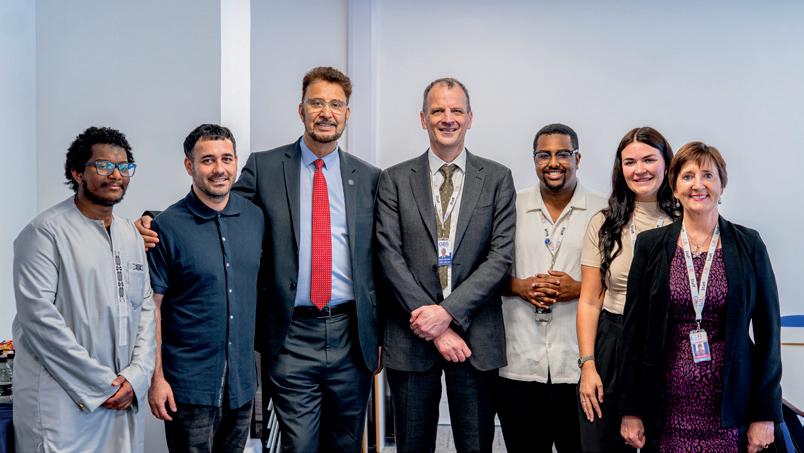
Afzal Khan, Member of Parliament for Manchester Rusholme, visited the GBS campus in Manchester to engage with students and staff and discuss the evolving skills landscape in the region.
The visit included classroom interactions where Mr Khan met students and teaching staff, gaining insight into the academic experience and the life-changing impact of education on adult learners. Mr Khan shared his own experience of gaining qualifications as a mature student and how it had a transformative impact on his life.
This was followed by a tour of the GBS Enterprise Hub, where he spoke with student entrepreneurs and the institution’s enterprise and employability advisers. The Hub plays a key role in encouraging entrepreneurial ambition and practical career readiness among learners.
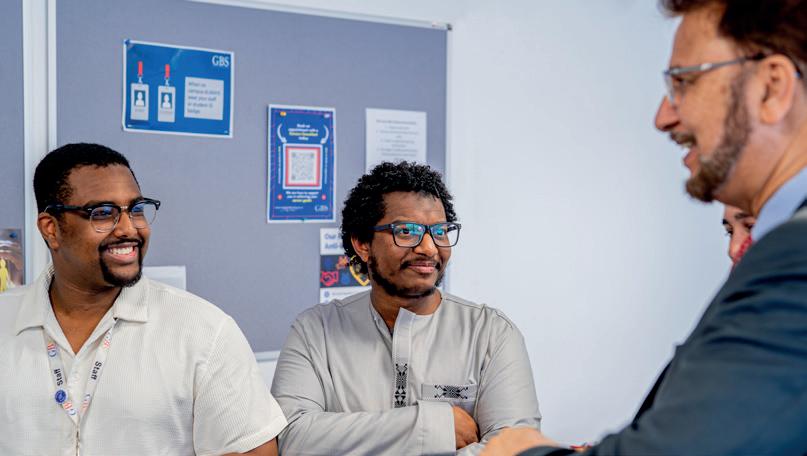
Afzal Khan, MP for Manchester Rusholme, said: “The opportunity to study at any age can provide people with new skills and opportunities invaluable to our local, regional, and national economies. It was fantastic to meet the staff and students at GBS in my constituency to hear about their dreams and how support for adult learning programmes contribute to them achieving these goals. I am glad the Government is committed to working with education providers to ensure institutions create opportunities and get everyone into well-paid careers.”
James Kennedy, CEO of GBS, said: “It’s always a pleasure to host MPs around the UK, to show them the tangible impact GBS is having within their communities.
“Working hand-in-hand with the government at every level is critical to ensure we continue to upskill students and meet the demands of industry, boosting local and national economies.
“Having Afzal Khan MP speak with students and staff also allowed him to share the great work he is doing as a local MP in the Greater Manchester area.”
The GBS Manchester campus continues to focus on supporting learners from diverse backgrounds, with a strong emphasis on employability, enterprise, and pathways into further study or professional advancement. The visit underscored the institution’s alignment with wider regional and national objectives around skills and opportunity.
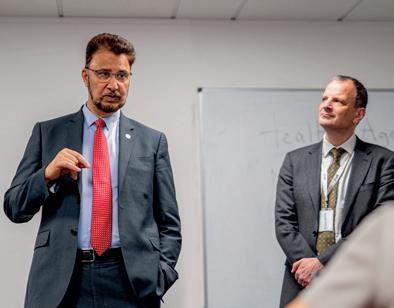
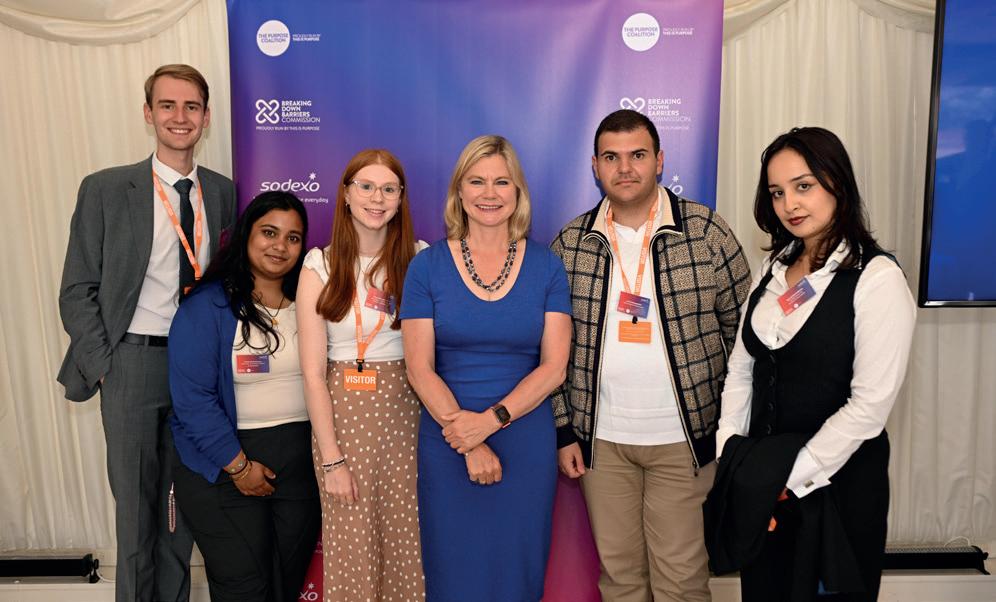
Purpose Lab student ambassadors take centre stage at House of Commons
Summer Reception
joined senior leaders from business, education, and government at the Purpose Coalition Summer Reception recently, held at the iconic Terrace Pavilion in the House of Commons.
Sponsored by Sodexo UK & Ireland, the event marked the close of the first session of the new Parliament and highlighted the growing momentum behind purpose-led collaboration and social mobility in the UK.
We have gathered their reflections below.
Manel Bouchekoua, Teesside University
“It was more than symbolic, it was transformational. I spoke about coding ethics into AI Bots, a principle I’m still learning, but one I believe must be nonnegotiable. I didn’t need to be a professor or policy lead to contribute. I just had to be present, prepared, and purpose-led. The Purpose Lab Summer Reception wasn’t just a networking event. It was a shift, where inclusion meant students like me weren’t on the sidelines. We were at the centre of the conversation.”
Aranija Sakthythasan, University of Chester
“I had the great pleasure of attending the Purpose Coalition Summer Reception at the House of Commons this month. Seeing so many organisations come together with a common goal of using innovation and social enterprise to bring about significant change was remarkable.
“Throughout the event, I had the opportunity to speak with policymakers and influential leaders from across business, education, and health. I also heard from Rt Hon Justine Greening, Chair of the Purpose Coalition, about the Purpose Coalition’s initiatives to promote social mobility.”
Matthew Paterson, Royal Holloway, University of London
“As a first-generation student the ability to be placed directly in front of employers and testify to them about what they can do to boost social mobility in the UK. The possibility to help shape good practice across the public and private sector, and shaping my own skills and personal development beyond this, is fantastic.”
Suren Hayrapetyan, Liverpool John Moores University
“It was an extremely inspiring experience to attend the Purpose Coalition Summer Reception 2025 at the UK House of Commons. The event, which was hosted in the historic Terrace Pavilion, brought together leaders from business, government and civil society who were all dedicated to removing barriers and creating a more inclusive and opportunity-rich UK. Being a part of a community that shares and upholds these values was inspiring to me both as a student and future leader who is committed to providing a major transformation.”
Chloe Sharman-Moss, University of Southampton
“I had a brilliant experience attending The Purpose Coalition’s summer reception hosted at the Houses of Parliament. When I arrived, I was able to network with professionals from many different companies, as well as individuals from The Purpose Coalition and fellow ambassadors. It was clear that all companies involved were deeply committed to improving social mobility and were more than happy to chat to us about the steps that their company is taking to improve social mobility and receive feedback from ambassadors.”
These reflections offer powerful testimony to the mission of Purpose Lab: placing young people with lived experience at the forefront of policy and business dialogue and proving that inclusion is most effective when it empowers new voices to lead the conversation.

At Capital City College (CCC), we pride ourselves on being the biggest provider of further education (FE) in London. But so often to get a job, people might not have the qualifications they need to get a foot in the door. That’s where further education comes in.
At CCC, we work with industry partners in alignment with the UK Government’s industrial strategy. We also focus on sectors in the London Growth Strategy: life sciences, digital, green, finance and professional services, creative and health, and hospitality.
Serving up top training in hospitality
The hospitality sector contributes £93 billion annually to the UK economy and employs 3.5 million people. According to UK Hospitality, it is the third-largest UK employer and in 2022 and attracted £7 billion in investment.2 It’s clear that further education has a role to play in this area, working hand in hand with businesses and students.
We are proud to have also recently invested in our Soho campus to focus on creative and digital industries, and to run our unique coding school 01F in partnership with Founders Forum (a global community and group of businesses empowering entrepreneurs).
Our stakeholder board, the Hospitality Employers Skills Hub (HESH), brings together employers, the GLA, DWP, UKH and FE colleges to examine barriers to entry level positions and assess skills gaps. We also developed an adult educational pathway to enter public and private sector catering with Culinary Medicine UK, where chefs learn more about nutrition and food waste, which are valued by employers.
Our classes are small, but our impact is big In the digital space, FE colleges like ours can upskill people into careers. My colleague, Carlo Lui, Head of Enterprise, Employability & Careers at CCC, said it best: ‘we literally train Londoners up to get them into work’.
Supported by the Mayor of London since 2002, our Digital Skills Academy has trained thousands of people in technology, from learning Python and coding to cyber security and AI for business. Our classes are small, but our impact is big.
One of our former students, Hiruth, wanted to gain digital skills, but didn’t know where to start. With our help, she enrolled in the Digital Marketing Internships programme, and gained industry-led training, mentorship and experience through real-world briefs. Thanks to the opportunities and education gained through our academy, today Hiruth works in
Communications and Events at Sidara. Stories like hers show how impactful a programme can be for just one person - it can literally change their life.
We are proud to have also recently invested in our Soho campus to focus on creative and digital industries, and to run our unique coding school 01F in partnership with Founders Forum (a global community and group of businesses empowering entrepreneurs).
We need more companies to work with us
This year we established the Network Rail Academy, in partnership with Network Rail. This aims to help young people in London who want training but may be missing formal qualifications. This academy will address skills gaps in the industry, but this is just one valuable sector, when we need more partners to help us make a difference.
It is my hope that more companies across industries will express their interest in working with us, to help train and educate the next generation. Now is the time for employers to step forward; not just to fill vacancies, but to shape futures.
Join us in building a workforce that’s skilled, educated and inspired.
The resignation of Angela Rayner last week after an inquiry into unpaid stamp duty has given Prime Minister Keir Starmer the chance to reshape his Cabinet. It was not the reshuffle he wanted, but it has allowed him to pivot decisively from mission-setting to the harder politics of delivery.

Rayner’s departure matters beyond the symbolism. She was one of Labour’s most recognisable grassroots figures and a bridge between the party’s left and centre. Her absence creates a political gap that will be hard to fill. It also leaves the post of Deputy Labour Leader vacant, raising the prospect of a contest that could re-open ideological divisions just as Starmer is trying to project unity.
The most striking feature of the reshuffle is the consolidation of power in Downing Street. Darren Jones, until now Chief Secretary to the Treasury, has been moved into a new role as Chief Secretary to the Prime Minister while also serving as Chancellor of the Duchy of Lancaster. His job is to ensure departments deliver on the government’s five missions. The shift reflects frustration at the pace of economic progress and reduces the Chancellor’s room to manoeuvre.
Starmer is making it clear that the centre, not the Treasury, will now set the tempo of delivery.
The other major changes underline this focus. David Lammy becomes Justice Secretary and has been given the title of Deputy Prime Minister, formalising his status as a key ally at the heart of government. Shabana Mahmood, previously at Justice, is promoted to the Home Office, where her reputation for grip and authority will be tested against rising public anxiety over crime and immigration. Yvette Cooper, long one of Labour’s most experienced frontbenchers, moves to the Foreign Office. For the first time in history, all the great offices of state other than the premiership are now held by women. Pat McFadden, a veteran operator trusted by Starmer, takes charge of a new super-ministry at Work and Pensions, which now combines welfare and skills in a clear attempt to tackle long-term sickness and labour shortages dragging on growth.
Beyond these marquee shifts, the Cabinet has been refreshed with figures chosen more for competence than colour. Steve Reed inherits the housing brief, Peter Kyle takes on business and trade, Liz Kendall moves to
science and innovation, and Emma Reynolds steps into environment and rural affairs. Douglas Alexander, a seasoned hand from New Labour days, returns as Scotland Secretary. Collectively, this is a Cabinet designed to deliver results quickly rather than court headlines.
The handling of Rayner’s departure also sends a message. Starmer did not want to lose her, but the standards inquiry left him little choice. The signal to colleagues is stark: probity now trumps politics. Ministers cannot expect loyalty or political calculation to shield them from scrutiny. The bar has been set higher than at any point in recent decades.
The risks of this reset are clear. A deputy leadership contest could become a proxy battle over Labour’s direction, distracting from the narrative of competence. Centralising authority in No.10 carries its own dangers if bottlenecks are not cleared and departments feel second-guessed. And unions, already anxious about signs of pragmatism on workers’ rights, are watching closely to ensure manifesto pledges are not diluted in the name of business confidence.
Yet the opportunity is equally clear. For months, critics have complained that Labour has been long on missions and short on delivery. This reshuffle answers that charge by installing allies with reputations for grip, experience and results. It gives No.10 a new command structure, elevates standards in public life and creates a Cabinet weighted towards competence over ideology.
Starmer has taken a political setback and turned it into a structural reset. The months ahead will show whether his new team can translate centralised authority into tangible improvements – shorter waiting lists, faster housing approvals, more investment flowing into the economy.
If they can, this reshuffle will be remembered not as the fallout from Rayner’s exit, but as the moment Labour’s government truly began.
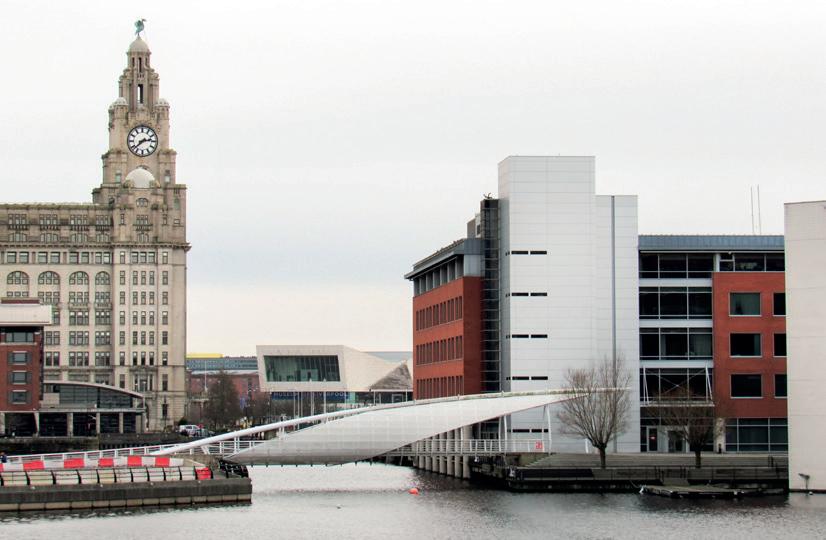
When Labour gathers in Liverpool this autumn, it will be doing so with the full weight of expectation pressing down on the government benches. A year after its landslide win, the party is no longer measured by the scale of its majority but by the speed of its delivery.
The mood is one of opportunity and anxiety. The five “missions” that Keir Starmer set out – growth, health, crime, clean energy and education – remain the lodestar. They are designed as decade-long goals, but the political clock ticks faster. By January this year Starmer’s personal approval had already dipped, with critics noting there was still “no positive story” to tell. That frustration has fed into a relentless managerial style: monthly 90-minute stock-take meetings in which ministers are interrogated on their progress. The message is blunt – the public must begin to feel the difference.
The Liverpool conference is the stage on which Labour will try to show that difference. The Plan for Change published last winter, breaking missions into annual milestones, will be used as proof of direction. Planning reform has been pushed through. Free breakfast clubs are being rolled out nationwide. The NHS backlog, while vast, has begun to fall at the margins. But progress remains uneven. Growth is forecast at just one per cent this year, well below the promise of faster prosperity. Living costs are still biting.
The September reshuffle outlined Starmer’s impatience. Angela Rayner’s resignation over an underpaid tax bill might have sparked the changes, but the Prime Minister used it to centralise power in No.10. Darren Jones was moved from the Treasury into the new role of Chief Secretary to the Prime Minister, charged with ensuring departmental delivery. Shabana Mahmood took over at the Home Office, signalling a tougher grip on law, order and immigration. Pat McFadden, a trusted fixer, was handed a super-ministry at Work and Pensions that now also covers skills – a recognition that cutting inactivity and raising productivity are inseparable.
This new Cabinet is designed to look like a government of results. For Liverpool, that means the spotlight will fall on what ministers can demonstrate rather than what they can promise. Starmer will point to stabilised industrial relations – after years of strikes, most disputes in rail, mail and the NHS have been settled through higher pay deals. He will highlight Britain’s re-entry into the EU’s Horizon programme, proof that the country is regaining its standing in international research. He will remind delegates of the UK’s visible role in supporting Ukraine and leading on climate diplomacy. Each is a sign that Britain, and Labour, are back in the world.
Yet tension is never far from the surface. Unions are pressing for faster movement on the Employment Rights Bill, wary that pragmatism with business could erode manifesto pledges. On the party’s left, grumbles continue about the use of private hospitals to cut NHS waiting lists, the failure to restore the full foreign aid budget, and the decision not to renationalise utilities beyond the creation of Great British Energy. For now, Starmer’s authority and his majority on the party’s National Executive Committee keep those voices subdued. But Liverpool’s fringe meetings may provide an outlet for that discontent.
The harder challenge is economic. The Office for Budget Responsibility’s downgrade of growth has made Labour’s promise to create the fastest-growing economy in the G7 look remote. Starmer’s first budget contained significant moves – a National Wealth Fund to co-invest in green industries, new funding for skills, a restored 45p tax rate – but he has clung tightly to fiscal rules. Welfare spending has been squeezed, with disability benefits not fully uprated, angering charities and parts of Labour’s base. The calculation is that fiscal credibility must come first, even at the cost of bruising headlines. But it leaves the government treading a delicate line between discipline and compassion.
Historical parallels are often invoked. Starmer’s advisers compare this period to Margaret Thatcher’s early years, when she was unpopular amid economic hardship but pressed on with her long-term plan. The hope is that by the 2029 election the benefits of Labour’s missions will be visible: more jobs, shorter NHS waits, improved schools, safer streets. The danger is that patience wears thin long before then.
For conference, the message will be humility and seriousness. Starmer has avoided flooding Parliament with bills, preferring to focus on a handful of big reforms: planning, energy, policing. The strategy is to under-promise and over-deliver and draw contrasts with Conservative governments that the government says promised much but often delivered little.
Liverpool 2025 will be used to signal continuity of purpose: that the hard work of “national renewal” has only just begun.
But beneath the speeches lies the pressure of time. Labour knows landslides can evaporate, as they did after 1997. The next election may seem distant, but the electorate is already restless. Starmer must convince both delegates and voters that Labour has not only a plan, but the discipline and grip to deliver it.
In Liverpool, the refrain will be simple: we have a plan, we have started to deliver, and Britain will see the change through if it keeps faith with this Labour government. Whether that rings true beyond the conference hall will define the next phase of Starmer’s premiership.

The Conservative Party arrives at its 2025 conference in a very different position from a year ago. Its landslide defeat in July 2024 – a collapse of 251 seats that left the party with just 121 MPs – was the worst loss in its modern history and ended 14 years in power. Rishi Sunak resigned almost immediately. Four bruising months later, the grassroots settled on Kemi Badenoch as their new leader, the first Black woman to head the Tories.
Badenoch’s election signalled both rupture and continuity. At 44, she embodies generational change and stylistic freshness. But politically, the choice of a staunch Brexiteer and economic free marketeer reflected the party’s instinct to tack right, not back to the centre. She won the leadership by promising “renewal,” a return to what she casts as core Conservative principles: low taxes, patriotism, personal responsibility and free speech. For many members, weary of tax rises, scandal and drift, her blunt style was invigorating. For critics, it looked like a lurch further into culture-war territory.
Her first year in opposition has shown both sides of that coin. Badenoch has been fierce in her attacks on Labour, accusing Keir Starmer of running a “high-tax, high-spend” government and warning of stealth taxes to come. She has rallied against what she sees as “trendy dogmas” in education and “political correctness” in Whitehall. Yet she has also shown an ability to modulate her tone. In weekly Commons debates she has avoided the sharpest language of her leadership campaign, attempting to present a more prime ministerial persona. Advisors are nudging her to build a platform that goes beyond opposition and speaks directly to middle-class concerns like economic competence, housing affordability and the NHS.
The strategic dilemma is clear. On one flank lies Reform UK, which peeled away disillusioned Conservatives in the 2025 local elections with hard-line stances on immigration and net zero. Badenoch knows that to win those voters back she must be robust on border control and sceptical of costly climate policies. She supports the Rwanda deportation scheme, has flirted with talk of leaving the European Convention on Human Rights, and has long warned against pursuing net zero “in a way that hurts British industry.” At conference she will likely accuse Labour of hypocrisy if it waters down oil and gas commitments or delays the petrol car phase-out.
But winning back the Reform vote alone will not be enough. The Tories also need to recover the centrist, often suburban voters in southern England who defected to Labour or the Liberal Democrats. The challenge now is whether she can straddle both audiences – projecting ideological clarity to the grassroots while reassuring swing voters that the Conservatives are once again a serious party of government.
Internally, she has moved quickly to stamp her authority. Her frontbench is packed with MPs from the 2017 and 2019 intakes, a signal that the Johnson, Truss and Sunak era is over. Party grandees and potential rivals, from Liz Truss to Boris Johnson, have remained relatively quiet – for now. Out of power, the old factions have less oxygen, but Badenoch knows unity is fragile. She is leaning on Labour as the common enemy, using attack lines on welfare cuts and cost-of-living pressures to galvanise activists.
The deeper reflection goes beyond personnel. Many Conservatives admit voters no longer knew what the party stood for after 14 years in office. Badenoch has launched a grassroots policy review to reconnect with local associations and give activists a sense of ownership. Early hints suggest a manifesto built around “growth, grit, and government off people’s backs.” Whether that resonates in a country that has just voted for more state-led renewal – and expects results on public services and inequality - remains an open question.
Time, paradoxically, may be on her side. With the next election not due until 2029, Badenoch has space to reshape the party’s image. Optimists within her ranks note that Labour’s early months in government have already been marked by falling approval ratings and controversies over welfare. Badenoch has seized on this, painting Starmer’s government as one that “over-promised and is under-delivering.” It is a tough sell so soon after a landslide defeat, but it sets the frame for a long fight back.
At this year’s conference, the Conservatives under Kemi Badenoch will present themselves as the voice of “common-sense Britain” against Labour’s economic caution: promising to restore freedoms and hinting at tax cuts or housing schemes that could form the backbone of their next manifesto. Yet beneath the fiery rhetoric lies a more delicate task: holding the base while tempting back the centre. How Badenoch handles that balancing act will determine whether the Conservatives can plausibly return to power after a single term in opposition, or whether a longer period in the wilderness beckons.
Reform UK’s 2025 party conference in Birmingham was the clearest signal yet that Nigel Farage intends to move his party from insurgent protest to would-be government.
Held at the cavernous NEC, it was pitched less as a rally and more as the kind of professionalised gathering one would expect of an established party. The trappings were there: exhibition stands, fringe discussions, policy pamphlets and, above all, a leader who dominated the stage.
Farage’s keynote, deliberately rescheduled to land in the midday news cycle, carried the air of a man who senses his moment. He painted Britain as a country “in a very bad place,” a nation let down by a political class that had presided over high taxes, high immigration and broken promises.
The tone was characteristically populist, but the substance was bolder than in years past.
Farage framed Reform as the “last chance” to put Britain back on track, echoing the kind of existential urgency that fuelled Brexit. Delegates responded in kind, rising to their feet with chants of his name, while the man at the centre urged unity and discipline, warning that Reform could only succeed if it avoided the infighting that had blunted other insurgent movements.

Policy announcements were designed to make headlines and to sharpen the party’s identity. On immigration, Farage doubled down on his pledge to “stop the boats” within two weeks of taking office, outlining an expansive deportation programme that would send back anyone arriving without permission. Delivering this, he argued, would mean withdrawing from the European Convention on Human Rights and establishing a new UK “deportation command.” Critics dismissed the scheme as impractical, costly and legally fraught, but Farage’s message was clear: only Reform would do what the Conservatives had promised and failed to achieve.
If immigration is the emotional heart of Reform’s pitch, energy and climate policy has become its ideological battlefield. Farage vowed to scrap net zero commitments within a hundred days, casting them as an elite obsession that was de-industrialising Britain and leaving families poorer. His call to “drill, baby, drill” in the North Sea was vintage provocation, but it also illustrated how Reform wants to turn green policy into the next Brexit-style dividing line. Environmentalists and economists accused him of reckless denialism that would jeopardise longterm prosperity. For supporters in the hall, though, it was common sense: proof that Reform was willing to say what others feared to admit.
Economically, the promises were lavish. The personal tax allowance would be raised to £20,000, inheritance tax abolished, corporation tax reduced. Farage insists these would be funded by cuts to quangos, the cancellation of major projects like HS2 and the scrapping of net zero programmes. Economists were quick to point out the fiscal black hole such pledges would create. Independent analysts calculated that the sums simply did not add up, while Labour branded Farage’s vision fantasy economics. Yet for the audience in Birmingham, the detail was less important than the headline: Reform will cut your taxes and make work pay.
On public services, the pledges blended populist rhetoric with eye-catching proposals. Farage promised to restore law and order with tougher policing, more prisons, and the end of what he called “wasteful woke projects.”
For the NHS, he pledged to wipe out waiting lists by harnessing private capacity and offering tax breaks to recruit and retain staff. He insisted care would remain free at the point of delivery but argued that vouchers and competition would drive down costs and speed up treatment. There was also a populist twist to welfare policy: the two-child cap on benefits would go, not to encourage dependency, Farage stressed, but to support working families. Winter fuel payments would be restored universally for pensioners, reversing Labour’s means-testing.
To critics, these policies were contradictory: grand giveaways that sat uneasily alongside sweeping tax cuts.
Strategically, the conference made clear that Reform is not angling for a pact with the Conservatives but for their replacement. Farage mocked Boris Johnson for betraying Brexit voters by presiding over record immigration, and his policy chief went further, calling Johnson one of the worst prime ministers in history. The message was not subtle: the Tories are struggling, and Reform is the true keeper of the Brexit flame. Defections from Conservative ranks, including Nadine Dorries, added spectacle to the claim that Reform is where the energy now lies.
The atmosphere in Birmingham was buoyant, but the reaction outside the hall was more mixed. Supporters saw a movement maturing into a credible challenger, with Farage’s clarity on borders and taxes cutting through disillusion with the old parties. Critics, however, warned of empty slogans dressed up as policy. Economists baulked at the fiscal arithmetic, climate campaigners condemned the net zero reversal, and refugee groups decried mass deportation plans as cruel and unworkable. Even some sympathetic commentators wondered whether a party with four MPs and limited administrative experience could truly present itself as ready for power.
Still, the sheer energy of the conference and the scale of the ambition suggested a party that believes it has outgrown the margins. Farage, flanked by his top team and leading delegates in the national anthem at the close, wanted to project not just defiance but readiness. Whether Britain sees him as the country’s “last chance” or simply as its loudest critic remains uncertain. What is beyond doubt is that Reform UK is no longer content to be a vehicle of protest. In Birmingham, Farage and his followers claimed the mantle of a movement preparing for power: even if the question of whether they could ever wield it effectively remains unanswered.

Few issues cut across economics, social justice, and generational divides quite like housing. In 2025, the government has put the crisis at the heart of its domestic agenda, promising to “get Britain building” on a scale not seen in decades. The mission is bold: 1.5 million new homes by 2030, an ambition that ministers say will ease chronic shortages and finally bring affordability within reach.
The centrepiece is planning reform: a long-promised fix for one of Britain’s most entrenched bottlenecks. For years, development has been throttled by restrictive local rules and determined opposition from residents’ groups. The new legislation is designed to tilt the balance. Local authorities must now meet mandatory housing targets in high-demand areas or face intervention from the centre. Councils can no longer treat targets as advisory, as they did under the Conservatives. Some green belt land close to transport hubs is being reclassified for development, while at the same time investment is flowing into brownfield regeneration to avoid uncontrolled sprawl.
The Office for Budget Responsibility believes these reforms could make a real difference. It estimates they will add 170,000 homes beyond current trends by the end of the decade, pushing annual construction to levels not seen since the 1960s. That alone could raise GDP by 0.2% by 2029–30 – around £6.8 billion – and, crucially for a government under pressure to show fiscal restraint, at “zero cost to taxpayers.”
Supply-side reforms, though, are only part of the story. Ministers have paired them with new levers to get more builders on the ground. A “Right to Build” gives communities and small firms help to develop smaller sites that have long been overlooked. Training 60,000 new construction workers is meant to close the skills gap that often limits delivery.
The government is also betting on modern methods, modular homes built in factories and assembled on site, to speed up completions. Institutional investors are being encouraged to fund affordable housing at scale, tapping private capital to accelerate progress.
The politics of demand has not been ignored either. First-time buyers remain a key constituency, especially in southern England where high prices lock younger families out of ownership. The First Homes scheme, new builds sold at a 30% discount to local buyers, is being expanded. A more targeted successor to Help to Buy is under discussion, possibly through equity loans in overheated markets. Renters, too, are promised change.
The Renters’ Reform Bill, expected to pass before the year is out, will abolish no-fault evictions in England, giving tenants security that campaigners have sought for decades. A new ombudsman will also handle disputes, while for the first time Decent Homes standards will apply to the private sector, forcing landlords to improve substandard properties.
Beyond that, ministers have capped social housing rents to curb sudden spikes and put councils back in the business of building. Relaxed borrowing rules for local authorities and fresh money for housing associations are intended to deliver 120,000 affordable homes over the next five years, many reserved for key workers who have struggled to live near their jobs.
Yet optimism must be tempered by realism. Local resistance has not vanished overnight; even with new rules, legal challenges and community pushback will continue. The construction industry faces headwinds of its own: higher materials costs, fragile supply chains and competition for labour. Analysts warn that hitting 300,000 homes a year, the threshold most experts say is needed, will require not just political will but unprecedented delivery capacity.
For now, the government is gambling that this combination of tougher planning, new training and targeted buyer support can finally shift the dial. If it succeeds, Labour will be able to claim it has cracked a problem that has eluded governments for half a century. If it falters, the promise of 1.5 million new homes risks becoming another entry in a long catalogue of missed housing targets.
In Liverpool this autumn, expect ministers to frame housing as proof of seriousness: a government that is not ducking the hardest domestic challenge but confronting it head-on. Whether those promises translate into cranes on skylines and keys in doors will determine not only the fate of the housing market, but perhaps the fate of the government itself.

Britain’s infrastructure has long been a byword for delay and underinvestment. Projects have stalled, budgets have spiralled, and successive governments have promised renewal without quite delivering it. In 2025, however, ministers insist that tide is turning.
A new 10-Year Infrastructure Strategy will, for the first time, lay out a national map of transport, energy, flood defences and digital networks in one integrated plan. Oversight will rest with a newly created National Infrastructure and Service Transformation Authority, tasked with ending the stop-start planning that has hobbled British projects for decades.
The ambition is sweeping. Coordinating rail upgrades with housing growth, matching energy supply to regional demand, and linking ports with new trade routes all reflect a shift to strategic thinking. Whether that vision can survive the political and financial realities is another question, but the intent is unmistakable: infrastructure is being recast as the backbone of national renewal.
On transport, the government has pledged continuity with course corrections. HS2 will run only between London and Birmingham, with the Birmingham–Manchester leg cancelled amid soaring costs and delays. Ministers have shifted focus to Northern Powerhouse Rail: a scaled-back upgrade of east–west links between Liverpool, Manchester and Leeds, centred on electrification, extra capacity and faster services. The original high-speed vision via Bradford or Leeds has faded, and real transformation now looks more likely in the late 2030s through the Transpennine Route Upgrade. Symbolically as much as practically, this signals a shift: after years of “levelling up” rhetoric, investment is finally being directed to long-neglected northern corridors, though with more modest ambitions.
Urban areas are seeing similar commitments. Birmingham and Manchester are expanding their tram networks, while London has secured funds to extend the Elizabeth Line and modernise tired Underground lines. Road’s policy, by contrast, has shifted down a gear. Ministers are wary of grand motorway schemes, preferring investment in maintenance and safety, with councils promised extra funds to tackle the potholes that frustrate commuters daily.
Not every decision has been cautious. A green light has been given to a third runway at Heathrow, one of the most contentious projects of recent decades. Ministers argue that post-Brexit Britain cannot afford to slip behind competitors in global connectivity. Opponents, pointing to environmental costs and local disruption, remain firmly against. But streamlined planning rules may yet tip the balance in Heathrow’s favour. Similarly, upgrades to Britain’s ports are being accelerated, in part to align with new trading patterns and the freeport model championed as part of the government’s growth plan.
The digital revolution is being treated with equal urgency. Gigabit broadband now reaches more than 80 per cent of UK premises, up from barely ten per cent a few years ago. The target of nationwide coverage by 2030 is ambitious but achievable, ministers insist,
especially with continued support from the Project Gigabit fund for rural areas. Alongside the spread of 5G, the hope is that faster connectivity will finally help technology jobs flourish outside the London bubble.
Perhaps the most significant shift lies not in any single project but in the attempt to rewrite the rules of planning. A forthcoming Planning and Infrastructure Bill promises to accelerate approvals for projects deemed nationally significant, limit protracted legal challenges and, where necessary, give government powers to override local objections. For advocates of renewables and transmission lines, this is overdue pragmatism. For communities wary of being impacted, it risks inflaming opposition. The same tension runs through reforms to national planning policy, where the aim is to spur development in growth corridors like the Oxford-Cambridge Arc, long championed as Britain’s future science hub.
An additional £13 billion in capital spending has been earmarked this Parliament, a clear signal that the government sees infrastructure as not just bricks and mortar but the foundation of economic competitiveness. The rewards, if delivered, would be tangible: faster journeys, fewer bottlenecks, more balanced growth between regions. Yet the ghosts of past failures haunt these promises. HS2 itself stands as a reminder of how easily projects can be derailed by political wobble, spiralling costs and local resistance.
The difference moving into 2026 is one of political will. After years of drift, ministers appear determined to force through projects that can show results within the decade. Whether this determination proves enough to overcome Britain’s chronic delivery problems remains to be seen. For now, the cranes on skylines and the shovels in the ground will be judged not just as signs of construction but as proof that the government has finally learned to match vision with execution.

With the modern Industrial Strategy finally unveiled this summer, ministers are seeking to quiet critics of short-termism and flickering economic frameworks.
The 2025 vision is ambitious: for the first time in nearly a decade, this is a full 10-year plan, backed by sector-specific blueprints covering life sciences, clean energy, advanced manufacturing, digital tech, creative industries and more. Published on June 23, and recently refreshed, it aims to boost business confidence through clarity, certainty, and strategic government support.
Underpinning it all is a newly created backbone: the National Infrastructure and Service Transformation Authority (NISTA), a hybrid of the old Infrastructure Commission and Infrastructure Projects Authority, charged with mapping and delivering the long game across transport, energy, telecoms and flood resilience.
Early reactions to the strategy have been both hopeful and cautious. Business groups that had long campaigned for a clear industrial vision welcomed its arrival, pointing to commitments on energy cost relief, skills investment and expanded finance as long-awaited lifelines for manufacturers. Others praised the emphasis on regional delivery, investment, and energy security, noting that it places the strategy at the core of a broader suite of long-term plans linking infrastructure, skills, and decarbonisation.
Critics, however, have not been shy. Several leading reviews argued that by leaving finance reform untouched, the strategy risks entrenching old structural barriers, with too little being done to shift the economy from speculation to production. Analysts also flagged that the headline electricity cost relief scheme remains vague and slow to launch, with only a fraction of manufacturers set to benefit before 2027. Regional assessments likewise highlighted that firms in advanced manufacturing hubs are still grappling with skills shortages, high energy costs, and weak public procurement, despite the government’s rhetoric of renewal.
These responses illustrate the central question hanging over the strategy: can this elaborate blueprint become durable policy, or will it gather dust like its 2017 predecessor? The government has delivered structure and funding pledges: including £275 million for industryspecific training, over £22 billion a year in R&D by 2029–30, and relief for up to 7,000 heavy energy users.
Great British Energy, the state-backed renewables champion created by legislation in May, solidifies the strategy’s clean power pledges.
Sector plans signal renewed intent. Targets aim to energise frontier industries and bind them to national prosperity, but critics argue they lack metrics, oversight, and the teeth to ensure delivery. A parliamentary committee even put ten tests in the strategy’s way: from clear goals and grand challenges to effective procurement and measurable capital access.
Defence and clean energy are emerging as areas where the Industrial Strategy is already intersecting with rapid action. Just this month, the government unveiled a £250 million Defence Industrial Strategy, combining economic growth with national security ambitions: part of a “defence dividend” approach. Five regionally focused “defence growth deals” promise jobs and investment across the country. Meanwhile, Great British Energy, the state-backed renewables champion created by legislation in May, solidifies the strategy’s clean power pledges.
The real test lies ahead. Provided infrastructure strategy, spearheaded by NISTA, remains aligned, the components of growth, investment, energy, and defense could, for the first time in years, operate in sync. But as PoliticsUK put it, the government must “turn words into results,” and fast.
Early reactions to the strategy have been both hopeful and cautious.
If the strategy lives up to its billing, Britain may find itself looking back on the mid-2020s as the moment it rediscovered its industrial ambition. If not, it risks slipping back into the murky haze of aspiration without action.

For all the noise of Westminster, one theme cuts through in 2025: Britain cannot grow without a workforce equipped for the jobs ahead. With a tight labour market, rising demands from business, and the lingering effects of Brexit on recruitment, ministers have turned skills into the backbone of their growth strategy.
The ambition is not just economic but cultural: to create a society where retraining at 40 or 50 is as natural as enrolling at 18.
At the heart of this agenda is the Lifelong Learning Entitlement, due to be phased in between 2025 and 2027. It is a radical attempt to break with the old patchwork of grants and loans. Every adult in England will be able to access the equivalent of four years of student finance over their lifetime, drawing it down for retraining or upskilling whenever they need it. In practice, that could mean a coding course in mid-career, modules in green technology, or credits that stack towards a degree. It is an effort to normalise continuous learning, not treat it as the preserve of the young.
Money is following the rhetoric. The 2025 Spending Review set aside an extra £1.2 billion a year for skills and further education by the end of the decade, enough to train an additional 65,000 young people annually. A new strand of Foundation Apprenticeships is being rolled out for 16-year-olds who might otherwise drift out of education, with placements in construction, engineering and other trades that have faced chronic shortages. Ministers cast this as both economic and social policy: plugging the gaps in key industries while keeping teenagers in productive training.
Crucially, the skills push is tied directly to the government’s industrial strategy. Officials have identified eight frontier sectors – from life sciences and clean energy to advanced manufacturing and digital – and are aligning training provision to match. That means green skills bootcamps to prepare thousands of workers for retrofitting homes, installing heat pumps, and servicing electric vehicles. It also means more places in AI, cybersecurity and software development, often in
partnership with firms willing to lend their expertise and equipment. The idea is simple: ensure the jobs created by technological change are filled by British workers, not left to chance.
Higher education reform is also being folded into this wider agenda. The government is exploring how the Lifelong Learning Entitlement can fund modular study, making it easier for people to return to university part-time or pick up credits across a career. Talk of abolishing tuition fees has given way to more modest but deliverable options: lowering interest rates on student loans or restoring maintenance grants to ease living costs. Universities, meanwhile, are regaining ground in research after the UK rejoined the EU’s Horizon Europe programme in 2024, restoring international funding streams and partnerships that had been fractured by Brexit.
The ambition is not just economic but cultural: to create a society where retraining at 40 or 50 is as natural as enrolling at 18. Ministers talk of a “culture of lifelong learning” underpinning higher wages and productivity. If the system works, it should produce the technicians to decarbonise homes, the carers for an ageing population, and the researchers pushing the frontier of AI and biotech.
It is a long-term bet. But across politics, business and education there is broad agreement that without it, Britain will continue to lag. In the battle for growth, skills are no longer a supporting act – they are the main stage.


BREAKING DOWN BARRIERS MAGAZINE